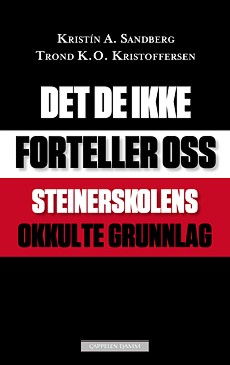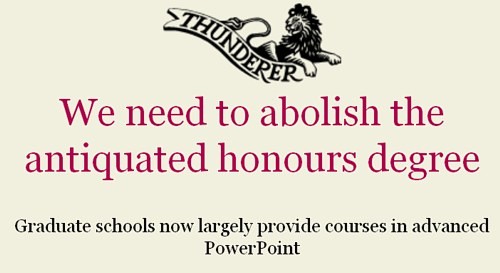Universities
This is part 2 of a critique of Steiner Waldorf schools. Part 1 was The true nature of Steiner (Waldorf) education. Mystical barmpottery at taxpayers’ expense. Part 1
The part 3 is Steiner Waldorf Schools Part 3. The problem of racism.
|
This essay is largely devoted to the methods used by the Steiner movement in the hope of getting state funding. That involves concealing from ministers and inspectors some of the less desirable aspects of the cult. That is sadly easy to do, because ministers and inspectors usually use a tick box approach that can easily be corrupted (just have a look, for example, at what goes on at the University of Wales). It is a classical case of bait and switch, a method that was used by chiropractors and acupuncturists to pervert the normally high standards of NICE. The technique is standard in alternative medicine, as described by the excellent Yale neurologist Steven Novella, in The Bait and Switch of Unscientific Medicine.. |
The involvement of a few universities with Steiner training is every bit as disgraceful as their involvement with quack medicine, In fact Anthroposophical medicine is among the barmier forms of quackery.
Here is part 2 of the essay by two of the most knowledgeable people on the topic. They are known on Twitter as @thetismercurio and @lovelyhorse_.
Steiner Waldorf Free Schools – ‘Do we have to mention Steiner, or Anthroposophy?’
At the time of writing we are aware of 16 Steiner Waldorf schools and new initiatives in the UK applying for or publicly expressing interest in Free School Funding. The established schools are:
- Brighton Steiner School
- Cambridge Steiner School
- Elmfield Steiner ‘Academy’ Stourbridge (see weekly news sheet)
- Exeter Steiner School
- Meadow School, Bruton, Somerset
- Michael House, Steiner Waldorf School, Derbyshire
- Norwich Steiner School
- Rudolf Steiner School Kings Langley, Hertfordshire
- Rudolf Steiner School South Devon
- St Michael Steiner School, Wandsworth
- St Paul’s Steiner School, Islington
Initiatives & kindergartens:
- Leicestershire
- Lincoln
- Mulberry Tree kindergarten, South Gloucestershire
- Beachtree kindergartens Leeds
- Cragg Vale, near Hebden Bridge, West Yorkshire
The umbrella organisation for Steiner Waldorf schools in the UK is the Steiner Waldorf Schools Fellowship. The Chief Executive Director of the SWSF is Christopher Clouder but another prominent figure is Development Director Sylvie Sklan. As representatives of the SWSF they have been the plausible public face of Anthroposophy, working for many years within the establishment to create the conditions for wholesale public funding of Steiner Waldorf schools in the UK. As pragmatists they see Michael Gove’s Free Schools Initiative as the Movement’s big chance.
We will take you into the woods to show how the Steiner edifice of nonsense has been obscured by smoke and mirrors. A government report indicates the truth, but the schools themselves are reluctant to share their Special Knowledge.
Into the Woods. A government report, and a very special inspection service
There is no independent evidence to support the pedagogy of Steiner Waldorf education. But supporting the funding of the Steiner Academy Hereford, the only state funded Steiner school to date (created under New Labour), is a government report from 2005, The Woods Report ‘Steiner Schools in England’. Mike Collins of UK Anthroposophy, home to some meticulous investigative work, demonstrates how the Woods Report describes Steiner Waldorf as Anthroposophical education.
In fact the Report’s authors are unusually candid about the occult nature of Steiner schools. They also, elsewhere, make no secret of their own immersion in the ‘spiritual’ assuming a common understanding of that ambiguous word, a word which is rarely defined. But whether or not they are themselves to any degree adherents of Anthroposophy, they clearly believe that education would benefit from Steiner’s spiritual vision, stating in the Forum Journal in 2006:
"The point is that Steiner education offers a distinctive process of opening and nurturing children and educating the whole child in the twenty-first century."
There is, in the Woods Report, an elaboration of the pivotal role of karma and reincarnation [p93] a description of the use of ‘temperaments’ to classify children [p89] and of the variance in the precise nature of allegiance to Anthroposophy amongst teachers [p94] (as observed in our first post: reflecting the nature of an esoteric religion). But ‘Steiner says’ is nevertheless the dominant code:
"Steiner’s lectures are referred to and teachers constantly update themselves on the pedagogical principles outlined by Steiner, testing these in the practice of collegial discussion.” [p105]"
This should be no surprise:
“Steiner education takes a particular perspective and entails a set of practices which relate to each other in order to give Steiner schools their character. These include the role of the teacher understood as a sacred task in helping each child’s soul and spirit grow, which underpins the commitment to each pupil and is the basis of sustaining the class teacher-pupil relationship over eight years” [p120]
This may strike the reader as rather an unusual educational aim, especially if a school is not formally classed as a ‘faith’ or religious school. Would it not take sophistry to maintain that this is not an essentially religious impulse? (It does. p97/125/129) But we must remember that we are handicapped by our ignorance of Spiritual Science. The clue is given by one of the Steiner teachers quoted, who suggests what is needed is to:
“communicate to [the] wider educational community that in essence Steiner education is a spiritual approach beyond religion” [p116]
To do them justice, in other published work the Woods are cautious, although this problem strikes us as inevitable:
“None of this should be taken to mean that Steiner schools achieve their ideals or are entirely without their flaws. Many teachers, in our view, are too dependent on following the guidance and ideas of Steiner as if they were ‘sacred’ directions.” ‘In Harmony with the child’: Philip A Woods & Glenys J Woods: Forum 48/3 2006
The Woods Report ignores the consequences for children of teachers’ adherence to the anthroposophical belief in karma and reincarnation. It is obvious that the potential for harm has not been recognised, nor taken seriously by those who should have read the Report. Instead it has been accepted that because the pedagogy is ‘spiritual’ it must be good: and the Hereford Academy has been handed funds, allowed exemptions (including the freedom to teach Steiner’s ‘Goethean science’) and stands as the precedent for further expansion of Steiner Waldorf into the State sector.
What kind of barmpottery would be too extreme for the Woods? The fact that Glenys Woods maintains she is a Reiki Healer (Angelic and Atlantaen) suggests that her beliefs about what is real would seem extravagant to those working within even the most complex and nuanced concepts of modern neuroscience.
The Woods Report suggests that Anthroposophy should be better understood by educationalists and parents; the writers clearly believe that, as a spiritual entity, it is of value. But they also attempt to diffuse the presence of Anthroposophy by stating that the “curriculum is not designed to guide and encourage young people into becoming adherents of anthroposophy…” [p120] which may appear to lessen the obligation to know what it is. When we are told the disingenuous line: ‘Anthroposophy is not taught to the children”, we should not forget that it is not explained to prospective parents either, even if there may be a few (ill-attended & bewildering) study groups for parents who have already joined. It isn’t explained to the government officials who anyway appear so incurious, or to taxpayers. We have none of us earned the right to the Movement’s Special Knowledge.
But Ofsted understands this. It knows it is not qualified.
As of September 2009 Steiner schools in the UK have been inspected not by Ofsted, who used to do so but by the Schools Inspection Service. The SIS inspects only two types of schools: those run by the Exclusive Brethren and now Steiner Waldorf.
The lay Inspectors in each case are expected to understand the distinct character of the schools. In the case of Steiner Waldorf, they have all been connected in some way with Steiner schools or with the Anthroposophical Movement.
Ofsted, which we believe feels unqualified to understand the pedagogy, has effectively allowed Steiner Waldorf schools greater powers to inspect themselves.
Free school funding relies on these inspections: the results of which are rather more positive under the new regime.
The Hereford Steiner Academy – the Academy nobody wanted.
The only state funded Steiner school in the UK has already caused controversy. Francis Beckett wrote in the Guardian in 2008 that former director of education Eddie Oram had turned down initial plans submitted on his watch because “he did not think the Steiner staff had the right expertise to deal with pupils with individual needs.”
Oram’s proof of evidence: to the Public Inquiry for the original applications by the DCSF to build a new school for the Steiner Academy, is comprehensive. There is no need, no desire and no justification for such a school in Herefordshire, especially in the village of Much Dewchurch. The Project Lead for the DCSF, sponsoring the Academy, was the Rev. Mark Evans, a church of England priest on secondment to the Department. His proof of evidence glowed with praise for Dr. Steiner:
“The outcomes of this education can be seen in the quiet confidence of its pupils, their balanced approach to life and their capacity for innovative thinking.”
But the Rev. Evans produced no evidence for this assertion, nor did he mention karma, or reincarnation. This seems a significant omission; he was in all probability unaware of the nature of the pedagogy he was selling.
The Hereford Steiner Academy site does mentions Anthroposophy, although to find it involves a little searching. The assertion that “Anthroposophy is a developing body of research”, as stated here by Hereford, should rightly be disputed. Essentially Anthroposophy is dogma; gained through ‘clairvoyance’, inherited by studying Steiner’s words, comprehended by those ascending the ladder of esoteric Knowledge. But something has to be said about it, now the Movement is forced to do so.
The Steiner Academy followed one of the recommendations of the Woods Report: unusually for a Steiner school it has a Principal, Trevor Mepham. In a long exposition to ‘Herefordshire Life’ on the nature of Steiner Waldorf education, Mepham misses the chance to satisfy another of the Woods Report’s suggestions: he doesn’t explain, by name, the system’s fundamental credo.
Free School Hopefuls
The current group of Steiner Free School hopefuls vary in their willingness to discuss Anthroposophy. As an example, on the website of the Norwich Steiner School Anthroposophy is not mentioned, although in reality it is never absent. The Norwich curriculum policy describes the pedagogy without mentioning its essence but we catch stray glimpses of angelic forms. So, a moral aim is to cultivate ‘reverence’ for nature, the children stand not in a doorway but on a ‘threshold’ and ‘The narrative thread for Ancient civilisations often begins with the fall of Atlantis’.
In the March 2010 newsletter from Norwich (‘Talking Trees’) there is an observation by a class teacher which exemplifies the Steiner Waldorf attitude to less spiritual forms of education:
“I look at the children in Oak Class and see a luminosity that cannot be measured. When we do measure children, we diminish that luminosity. The world seems to be full of children whose inner light has been subdued, if not entirely extinguished.”
There is at the time of writing no mention of Anthroposophy on the website of the Rudolf Steiner School South Devon, except towards the end of the parents’ handbook. Although this is hard for outsiders to find, the handbook’s author still neglects to describe karma and reincarnation and includes the unusual proviso that this is ‘not a cult’. South Devon has stated on its site:
“The department [DofE] appears to be impressed by our application, in particular what they call our "strong educational vision". But before they can proceed to the next step they have asked to see stronger evidence of demand for Steiner education in the area, including from those outside the school community. They would prefer this to be in the form of a petition.”
Many of those who have agreed to sign the South Devon petition have done so in ignorance of even the name of the ‘philosophy’ that is so vital to the school, imagining that their plausible description of Steiner Waldorf is sufficient.
In a ‘circle meeting’ held at the South Devon School in 2008, found on the web, someone even asks the question: “Do we need to mention Steiner, or Anthroposophy?” It’s hard to lose the guru’s name without changing all the signs. But surely local people might be put off if they understood how the education at this school is intimately informed by the clairvoyant visions of the Mystic Barmpot. We’ve screenshot the site, in case there are any alterations.
This concern about mentioning Anthroposophy is driven by a fear that an undercurrent of critical analysis will become mainstream.
Critics
We trust we presented in our previous post a description of Steiner Waldorf Education that identifies the intrinsic role of Anthroposophy, making the system and its flaws intelligible, but we are not suggesting that our observations are original.
Not only have there been comprehensive posts about Steiner schools on the popular political blog Liberal Conspiracy (with much additional material from Unity, including the 5 Big Ideas of science that Steiner education can’t handle); there has been in the last few years an international stream of criticism from those who have experienced Waldorf pedagogy and its effects on families. Ex-parents, students and teachers of Steiner Waldorf schools have appeared on-line, seeking answers; making sense of their own distressing experiences, expressing bewilderment and anger and frequently offering support to others.
Their words appear on blogs, on internet forums and in the press in some countries, although no UK journalist has so far grasped the significance of their warnings. What should be reiterated is that it is difficult to make sense of an esoteric (hidden) philosophy in action, even if you have chosen to be involved at its aesthetically pleasing outer edges. For many parents, Waldorf is a form of bait and switch.
mumsnet: “You don’t expect a school to lie,”
In the New Schools Network document cited in our previous post, Free School hopefuls are advised how to advertise their projects: “Post something on mumsnet, netmums, or facebook.” If the NSN had done their homework, they would know that mumsnet Steiner threads have been so controversial (and incomprehensible to those not involved) that in 2008 parents were asked by mumsnet’s co-founder Justine Roberts not to post about Steiner education at all. Indeed the forum was threatened with legal action by Sune Nordwall, (also known as Thebee, Tizian, Excalibur, Mycroft etc) a Swedish anthroposophist; since discovered to be in the employment of the Swedish Waldorf School Federation. Blogger Alicia Hamberg aka zooey quotes (in translation):
“In England, the attacks on [waldorf] pedagogy have led to parents withdrawing their children from the waldorf schools. The [Swedish Waldorf School] Federation has employed Sune on a part-time basis to monitor the debate.”
We do not suggest on this blog that the Swedish Waldorf School Federation are responsible for or complicit in Nordwall’s activities on mumsnet or elsewhere, although as Alicia Hamberg points out, they have not sought to distance themselves from his behaviour. What is notable though is that representatives of Waldorf education in Sweden were concerned to monitor a UK debate held not in the press but in the relative obscurity of the supposedly safe, supportive world of mothers‘ chatrooms. The Steiner Waldorf movement understands the importance of a positive profile on the UK’s most influential meeting place for parents; the very people who form their customer base. But their tactics are counterintuitive. In anthro-speak everywhere, critics, the majority of whom are parents who have had children in Steiner schools, become attackers.
Even the Steiner Waldorf Schools Fellowship’s Communications Officer Jeremy Smith felt drawn to issue a call-to-arms to rebuff those who dared to question Waldorf’s ‘good intentions’:
“I would be very grateful if teachers and parents who share these concerns would be willing to join me in posting replies to anti-Waldorf threads in an attempt to give a more accurate picture to the outside world of what Steiner education is all about. We are also co-ordinating this internationally through the European Council for Steiner Waldorf Education. Please contact me at smithj@rsskl.org if you are interested in becoming involved.”
We invite them to answer us here, instead.
Stockholm University: “scientifically unacceptable… simply untrue”
There are other interesting comparisons with Sweden. A recent announcement that UK Free Schools will not be required to employ qualified teachers indicates that the UK is traveling in the opposite direction to Sweden which, in an attempt to raise standards has just introduced more stringent teacher training requirements for all its schools, including Waldorf (the state funding of which pre-dates Sweden’s own Free Schools experiment). Swedish Waldorf schools will have to apply for exemptions from these guidelines (as well as from new requirements regarding early years literacy and numeracy), since there are no university accredited Waldorf teacher training courses in Sweden.
Indeed the aspirations of Swedish anthroposophists suffered a blow in 2008 when Stockholm University closed the Waldorf teacher training courses in the Institute of Education it had recently taken over. The VC of Stockholm, Kåre Bremer, agreed with his Education Faculty that the Waldorf literature did not satisfy the University’s standards of “scientific validity” and that “Some of the content is not only scientifically unacceptable, it is simply untrue.”
Alicia Hamberg described the ensuing outcry from the Waldorf community; quoting the dean of the faculty of natural sciences and professor of bio-chemistry, Stefan Nordlund, who stated in a Swedish newspaper article:
“In parts, the students’ course literature is not simply unscientific. It is in fact dangerous, and it conveys misconceptions which are worse than muddled. We are supported by the department of natural sciences as well as the department of humanities in taking this position.”
A relaxation of teaching qualifications here in the UK is essential if Steiner Free Schools are to be given the green-light, since the UK’s only Steiner BA and the Foundation Course in Steiner Early Years education at the University of Plymouth are also closing. Plymouth’s new VC, Prof Wendy Purcell, herself a scientist, can claim credit for ejecting the Mystic Barmpot from her faculty of education. It is certainly true that the course didn’t attract sufficient numbers to be viable, even though it appears that Steiner trainee teachers were supported by the beneficence of a ‘godparents anthroposophical training fund.’
Mike Collins posted a fascinating investigative report into the Plymouth closures in November last year. At the time of writing this, a representative of the University told us that they have no plans to reintroduce Steiner teacher training.
However: in a plot twist which links both countries, it is not Stockholm University (which had rejected their Steiner courses for being unscientific) but the University of Plymouth which is accrediting a European Masters Programme in Eurythmy, described as an anthroposophical ‘dance form’: in collaboration with Rudolf Steiner University College Järna, 50 km South of Stockholm. Except that Rudolf Steiner College, Järna is not regarded as a university college by the Swedish National Agency for Higher Education, nor can it issue formally recognized degrees. We do not imagine that anyone at Plymouth outside the dwindling Steiner BA is familiar with eurythmy, or its therapeutic arm, curative eurythmy.
One of the aims of the European Masters course is: “to place Eurythmy in the context of modern education,” but this can only apply to Waldorf.
Eurythmy is a physical expression of Rudolf Steiner’s anthroposophical image of the relationship between the ‘spirit’ and the physical worlds. It is steeped in the supernatural. Of course what is happening in reality as participants sway and dash is not exactly what eurythmists imagine is happening, as anyone familiar with CAM will understand. But an intention clearly exists. Once again, in Steiner Waldorf schools, there is that anthroposophical concern for the ‘incarnating’ child. As Steiner told his teachers:
“You cannot teach anthroposophy directly to children but they can do eurythmy. And they will face life in quite a different way than if they didn’t do eurythmy.”
From “Times of Expectation: New Forms of Ancient Beauty out of the World of the Spirit.” Lecture, Dornach, 7th October 1914 (final section). Steiner introduces eurythmy to the anthroposophists
Where are the teachers to come from for these new UK Steiner Free Schools? More to the point: will taxpayers have any access to the content of their courses?
Waldorf Critics: criticism and scandal
|
Steiner Waldorf causes scandals across the world. In Norway earlier this year, Kristín Sandberg and Trond Kristoffersen, both former Steiner Waldorf teachers, published their book: "What They Don’t Tell Us = The Occult Foundation of the Steiner School." They have been part of a fierce debate, subject to threats from certain elements of the Steiner community, but Kristin is positive. What really matters to her, she says, are the many messages of support:
|
In Germany too, Steiner Waldorf has many critics. It’s interesting to reflect on the German Waldorf demographic, which suggests that their appeal lies in their status as ‘elite’ (although not academically elite) institutions.
In Australia, the introduction of ‘Steiner’ streams into public schools in the State of Victoria: ‘The Steiner Cult’s Grab for Schools’ has caused great controversy (see The delusional world of Rudolf Steiner). A document by the Australian Rationalist Society mirrors our initial post. After serious concerns were raised in a government report as long ago as 2000, and ignored; great division has been caused between parents in the schools involved and academic standards have proved to be low. Australian newspaper reports rehearse what will be in the news in the UK if Free School funding goes ahead for Steiner Waldorf. To quote from The Age:
“One parent, who did not wish to be named, said she moved her son out of the school after a Steiner teacher recommended he repeat prep "because his soul had not been reincarnated yet".
"I just don’t believe it is educationally sound," she said.”
Humanists are not the only Waldorf critics in Australia: some worry that Anthroposophy doesn’t sit happily with their Christian beliefs. Plus, independent Steiner schools have been accused of misappropriating Federal grants designed for new classrooms and libraries. It’s tempting to ask what use anthroposophists have for books.
In New Zealand, flaws in the accountability of independent schools compounds one family’s alarming treatment at the Titirangi Steiner School. Whether or not their experience is a direct consequence of Steiner pedagogy, the school’s reported ineptitude, delaying tactics and exclusion of children reflects behaviour familiar to many other Steiner Waldorf parents.
But by far the most well-known site for analysis of Steiner Waldorf is the US based PLANS: People for Legal and Non-Sectarian Schools, an organization which opposes the presence of religious schools: Steiner Waldorf, informed by Anthroposophy, in American public education. It is difficult to imagine that any UK government intending to spend millions on funding a school system within Academy or Free Schools funding (and concerned with a responsibility to children regardless of the mantra ‘parent choice’) can have entirely overlooked the presence of such criticism, or of the existence of a Waldorf Survivors’ Group. Indeed, if they read the Woods Report, they will find PLANS featured there. (p35)
There are clues to the reasons for the generally positive Waldorf press in the US in a series of posts by artist and animation art director Carol Wyatt:
“The vast majority of parents at PWS [Pasadena Waldorf School] work in entertainment. Actors, producers, art directors, writers, and all others in TV, film and technology. Almost all tuitions are paid for by media. They could not function without our industry.”
The most comprehensive (and readable) critical guide to Anthroposophy’s relationship to Steiner Waldorf schools is at Roger Rawling’s ‘Waldorf Watch’. Rawlings was for many years a pupil at a New York Waldorf school, so he’s familiar with how it feels to be inside the system. His pages on Karma, central to Steiner’s doctrines, as well as those on the background to Waldorf’s distinct attitude to Special Educational Needs (including the use of Curative Eurythmy) are particularly instructive.
Steiner Waldorf – “We must worm our way through”
Steiner Waldorf Schools all over the UK are applying for Free School funding. Millions could be diverted from local schools to support them. The decision to fund lies ultimately with the Secretary of State. We have every reason to believe that he is now personally aware of Anthroposophy, even of the critical role of karma and reincarnation within Steiner schools and the content of the course literature that forms a central part of Steiner Waldorf teacher training courses. We would like to ask him: who would be served by the funding of these schools? We do not believe it can be the children, or the families (many involved with hopeful, small initiatives) who do not understand what Steiner education really is. So, Mr Gove: cui bono?
“We must worm our way through…[I]n order to do what we want to do, at least, it is necessary to talk with the people, not because we want to, but because we have to, and inwardly make fools of them.”
Rudolf Steiner, Conferences with Teachers of the Waldorf School in Stuttgart, vol.1, 1919 to 1920 Forest Row, East Sussex, England: Steiner schools Fellowship Publications, 1986 [pp. 125]
Follow-up
Very sorry to see that the University of Aberdeen is running what seems to be a very dubious Steiner course.
The proposals made here are intended to improve postgraduate education with little harm to undergraduate education and no extra cost. It is not intended to get the government off the hook when it comes to funding of either teaching or research. The recent Royal Society report, The Scientific Century: securing our future prosperity, makes it very clear that research funding in the UK is already low.
|
There is a good summary of the financial case at Science is Vital. Even before cuts the UK invested only 1.8% of its GDP in R&D in 2007. This is short of the UK’s own target of 2.5%, and further behind the EU target of 3.8%. If you haven’t already, sign their petition. |
The article reproduced here is the original 800-word version of proposals made already on this blog.
It was published today in The Times, in a 500 word version that was skilfully shortened by Times journalist, Robbie Millen [download web version, or print version] . It made the Thunderer column (page 22) It was written before I had seen the Browne report on University finance, Comments on that will be added in the follow-up.
Honours degrees have had their day
Universities have problems. The competition for research money is already intense in the extreme, and many excellent research applications get turned down. Vice-chancellors want students to pay huge fees. A financial crisis looms. It is time for a rethink the entire university system.
The traditional honours degree has had its day
The UK’s honours degree system is a relic left over from the time when a tiny fraction of the population went to university. The aim is now for half the population to get some sort of higher education, and the old system doesn’t work. It tries to get children from school to the level where they can start research in only three years. Even in its heyday it often failed to do that. Now teachers in vastly bigger third year classes try to teach quite advanced stuff to students most of whom have long since decided that they don’t want to do research. It’s just as well they decided that, because academia doesn’t have jobs for half the population.
The research funding system is strained to breaking point
Vince Cable’s cockup over the amount of money spent on mediocre science has long since been corrected But despite the intense competition for research funds, anyone who listens to Radio 4’s Today Programme (I do), or reads the Daily Mail (I don’t) might get the impression that some pretty trivial research gets published. One reason for this is that science reporters always prefer the simple and trivial to basic research. But another reason is that the system places enormous pressure to publish vast amounts. Quantity matters more than quality. The Research Assessment Exercise determines the funds that a university gets from government, and although started with the best of intentions, it has done more to reduce the quality of research than any other single change in the last 20 years.
Promotion in universities is dependent on publication, and so is university funding. Since 1992, when John Major’s government converted polytechnics into universities at a stroke of the pen, their staff too have been expected to publish to be promoted. We need a lot of teachers to cope with 50 percent of the population, but there just aren’t enough good researchers to go round. It is a truth universally acknowledged that advanced teaching should be done by people who are themselves doing research, but the numbers don’t add up. So what can be done?
Another way to organise higher education
The first essential is to abolish the honours degree (cue howls of outrage from the deeply conservative vice-chancellors). It is simply too specialist for an age of mass education. Rather, there should be more general first degrees. They should still, by and large, aim to produce critical thinking rather than being vocational, but cover a wider range of subjects to a lower level,
If this were done, the necessity to have the first degrees taught by active researchers would decrease. Many of them could be taught in ‘teaching only’ institutions. They could do it more cheaply too, if their staff were not under pressure to publish papers constantly. It would take fewer people and less space. It isn’t ideal, but I see no other way to increase the numbers in higher education without spending much more than we do now.
After the first degree, that modest fraction of students who had the ability and desire to get more specialist knowledge would go to graduate school. There they could be taught at a rather higher level than the present third year of an honours degree, and be prepared for research, if that is what they wanted to do.
Hang on though, isn’t it the case that UK Universities already have graduate schools? Yes, but they are largely offshoots of HR that provide courses in advanced powerpoint and life-style psychobabble. Vast amounts of money have been wasted in the “Roberts Agenda”. What we need is real graduate schools that teach advanced stuff. Education not training.
There is another problem. It is very hard now for anyone in research to find time to think about their subject. Most of their time is occupied writing grant applications (with 15% chance of success), churning out trivial papers and teaching. If much of the lower level undergraduate teaching were to be done, more cheaply, in places that did little or no research, the saving would, with luck, fund the extra year for the minority who go on the graduate school. The research intensive universities would do less undergraduate teaching. Their staff would have more time to do research and teach the graduate school. They would turn into something more like Institutes of Advanced Studies.
A lot of details would have to be worked out, and it isn’t ideal, just the least bad solution I can think of. It has not escaped my attention that this system has some resemblance to that in the USA. The USA does rather well in science. Perhaps we should try it.
What we should not copy is the high fees charged in the USA. Education is a public good, and the costs should be met by people paying according to their means. I think that is called income tax.
Follow-up
The Browne report is a retrogressive disaster
As I understand it. the recommendations not only remove the cap on fees but also make it more expensive for most people to repay loans. It is the most retrogressive thing that has happened in education in my lifetime. According to an analysis cited in the Guardian
“Graduates earning between £35,000 and £60,000 a year are likely to have to pay back more in fees and interest than those earning more than £100,000”
That is far to the right of anything that Mrs Thatcher contemplated. If it were to be adopted, it would be a national disgrace.
The Lib Dems are our only hope to stop the recommendations being implemented. They must hold the line.
15 October 2010.
It is getting clearer now. Numbers from the Social Market Foundation (SMF) were quoted in the Financial Times as showing that the rich pay less than the poor for their degrees. At first the Institute of Fiscal Studies (IFS) seemed to disagree. Now the IFS has rethought the analysis and there is little difference between the predictions of the liberal (SMF) and conservative predictions, There is, unsurprisingly, some difference in the spin. ISF says that you only pay less in the top two deciles of lifetime income, ie. the top 20 percent. That’s not quite the point though.
Both analyses agree that anyone above the median income pays back much the same (until it decreases for the top 20 percent). In other words, unless you earn less than around £22k. there is little or no progressive element whatsoever.
It is an ill thought-out disaster.
Vince Cable, the Secretary of State for Business, Innovation and Skills, said on the Radio 4 Today programme on September 8th 2010
“There was some estimate on the basis of surveys done recently that something in the order of 45 per cent of the research grants that were going through was to research that was not of excellent standard. So the bar will have to be raised.”
The suggestion that 45 percent of research is mediocre provoked a storm, first on Twitter, than in blogs. One of the earlier blogs was In one day, Vince Cable has become an object of ridicule and loathing Those that followed were scarcely more flattering. The number he quoted was simply wrong.
Unravelling Cable says "when the text of the speech was released, I was shocked by what it revealed about the Secretary of State’s grasp of his brief.".
A legion of people have tried to decode what he meant. The purpose of this post is to go a bit further, to investigate the problem of mediocre research and to suggest a change of policy that might help.
This appears to be what Cable should have said.
(1) His comments don’t refer to the main source of money for research at all. They refer to "quality-related" (QR) money given to universities by the Higher Education Finding Council. It is intended to support the infrastructure for support, but it vanishes into the ever-expanding administration and most researchers don’t see a penny of it.
(2) QR money is not given to individual researchers to do research, it is given to the university retrospectively, on the basis of the score in a vast, time-consuming, assessment known as the Research Assessment exercise. This grades departments on the basis of the amount of grade 1 2 3 or 4 research they do.
(3) Cable’s comment . on the BBC Radio 4 Today Programme that “45% of research grants were not of excellent standard", caused uproar, and rightly so, because it shows a total lack of grasp of how science is funded, The "45%" doesn’t refer to grants at all, but it is the percentage of work that was judged in the RAE to be grade 1 or 2 (less good) rather than 3 or 4 (very good).
(4) Work that is graded 2 gets little QR money, and 1 gets none at all. David Sweeney, a HEFCE bureaucrat not generally noted for his understanding of research, points out that the 45 percent of 1 and 2 work gets only 7 percent of the funds. Using Cable’s criterion his number should have been 7% not 45%.
(5) In physics at least, the RAE panel claims it was told to use norm-referencing. This means that they are told roughly what fractions 3 and 4 grades to produce. HEFCE deny this is the case, but it is quite usual for big organisations to lie about this sort of thing. Insofar as norm-referencing was imposed, the fraction of research that is labelled mediocre is pre-determined, and is quite independent of quality. It means no more than saying that half the people are below average. It is just a statistical inevitability (if the distribution is symmetrical). It tells you absolutely nothing about the quality of research,
(6) A figure far more important than any of these is that only 10 – 20% of research grant applications get funded. It takes a long time to write a research grant application, something like two months. That is a major time-consuming activity for scientists, who should be thinking about science and doing experiments. Around 85% of that effort is fruitless. The cost in salaries and lost output of writing grants that fail is enormous. Being high alpha rated is certainly no guarantee of getting funds. That is the number that Cable should have produced, but didn’t.
So what did Cable get right, and why?
This is the bit that hasn’t been discussed much in the comments so far.
If it so hard to get a grant, why is there a widespread perception that quite a lot of published work is, if not wrong, at least trivial?
(1) Most work has always been trivial. Great breakthroughs are very rare events. But let’s accept, for the sake of argument, that the widespread view that it is worse now that in used to be, or at least that quality hasn’t improved.
(2) There is now enormously more research than before. That means more top-rate work, but, perhaps, even more bad or trivial work
(3) The Research Assessment Exercise (RAE) is on of the main reasons why the fraction of good papers is perceived to have decreased. It has probably done more harm to research standards than any other single change in my lifetime.
(4) Although it is tempting to blame politicians for the harm done by the RAE, the greatest harm is actually done by senior academics and other ex-researchers, and their numerous administrative hangers-on, who apply intolerable pressure on their juniors to publish large numbers of papers, preferably in one of three ‘top’ journals. This inevitably leads to large numbers of trivial papers being produced, because people think they won’t be promoted if the don’t go along with the senior bullies,
(5) The fate of young researchers is made even worse by HR’s attempts at "well-being" (major post coming up on that topic), the money wasted on ‘Roberts agenda’ skills training and the utterly vacuous Concordat
(6) A consequence of this sort of pressure is that anyone who wants to think deeply, or to understand properly, the basis of what they are doing, is quite likely to be fired for lack of "productivity" before they produce their best work (I speak here of biomedical sciences. I presume that physicists can’t get way so easily with poor understanding of principles of their subject).
(7) The result is a system that is not just over-competitive, but positively cruel to young scientists. The miracle to me is that anyone wants to work in science at all in the present state of universities. It is a sign, I guess, of just how wonderful it is to find something new, that people still put up with a system that seems, at times, not much different from slavery. See, for example, The Mismeasurement of Science by Peter A. Lawrence
.
(8) Not all the slavery is, of course, quite was bad as the famous chemist at Caltech who berated his slaves for not working (for his glory) seven days a week (though things not far short of this are quite common). And not all universities are quite so stupid as the Texas A&M University, which is reported to be thinking of hiring on the basis of the amount of grant income you bring in, although Imperial College London got alarmingly close to this sort of insanity. I guess I shouldn’t feel bad about other universities behaving in a way that makes anyone who is any good not want to work for them, but the matter is too important for one to worry about inter-university rivalry.
(9) The over-competitiveness and encouragement of trivial science, quantity rather than quality, has been going on for long enough now, that people who have risen on that basis now have power, and are to be found even on review panels of grant-giving bodies.
(10) Organisations like the Medical Research Council used to have permanent staff who developed a high level of expertise in the subjects they dealt with, and a great deal of expertise in the critical duties of knowing which referees to select, and how to judge what they wrote. More recently, the turnover of MRC staff has been too great for that sort of expertise to be well-developed, I have no axe to grind myself. My last program grant as PI (1999 – 2004) was funded, as was its successor (2004 – 2009, in which I was co-applicant). But recently I have seen feedback on failed grant applications (not mine) that suggest that the review panel either hadn’t read or hadn’t understood them.
(11) There is an enormous shortage of money for ‘response-mode’ grants. That means grants submitted by individuals to fund projects that the individual thinks will work. One reason for that is the research councils and charities have, increasingly, ring-fenced funds for work in a particular area, which some committee has decided ie important. Often this results in money being given to projects that don’t work very well (as I have seen at first hand when on the panel for the BBSCR Neuron initiative). These "initiatives" may sound good on paper to politicians, but they result in mis-spending of taxpayers’ money.
(12) One thing that Cable is dead right about ir that the ‘graduate tax’ is by far the fairest way to fund degrees. Sadly vice-chancellors line up to condemn it (you can’t get the staff these days).
So what can be done?
I’ve listed a lot of criticisms, but what can be done about it?
I can see a couple of things that could be done. The main thing is to reduce the intense competitiveness that leads to low quality. The competitiveness arises in part because of the large increase in the number of universities that took place in 1992, when the then Conservative government converted at a stroke polytechnics and technical colleges into universities, This was done largely to increase the number of undergraduate students, something of which I advocate strongly. I also feel strongly that teaching at an advanced level should be done by people who are doing research in the area they are teaching about. This is what governments have tried to do since 1992, but the numbers just don’t add up. There are simply not enough good researchers to teach half the population, yet the promotion of everyone has been made to depend largely on research.
One way would be to retain honours degrees but make the post-1992 universities into teaching only institutions. That would be the wrong solution in my view. It would result in a lot of teaching being done by people barely able to cope with advanced stuff.
My proposal.
(1) The conservatism of some senior academics has meant that they have failed to recognise that the traditional honours degree is quite unsuitable for a mass education system in which 50% of people do a degree.
(2) We should abandon altogether the honours degree system, which attempts in 3 years to take people from high school level to research level in 3 years (even with smaller numbers of people it often failed to do that anyway).
(3) We should start with much wider general degrees where teaching could be at a lower level and be done in universities that did little research. Such degrees would still aim at critical thinking rather than being purely vocational. Reluctant though I am to see teaching and research separated, it has become an economic necessity and the harm should not be too great if the separation applies only to general first degrees,
(4) After this general first degree, students would either do vocational training, or if they wished to continue along the academic line, they would go to graduate school.
(5) By graduate school, I mean teaching in the advanced aspects of their chosen subject, as is done in the USA. Most UK universities now have something called a graduate school, but they are largely charades which teach advanced powerpoint presentation but nothing intellectual. Our own summer school was originally taught as part of the UCL graduate school, but was dropped by them on the grounds that it was education not training. Protests that a knowledge of mathematics was the ultimate transferable skill in science, fell on deaf ears.
(6) The graduate schools would be the place where the advanced teaching was done, and also where most research was done. To make this feasible for the staff, they would have little, or even no, undergraduate teaching. They’d be more like ‘institutes of advanced studies’.
(7) This proposed system is, of course, much more like the system in the USA than the present UK system. It’s worked rather well there. We should try it.
I was asked recently to write a reply to an article about "research managers" for the magazine Research Fortnight. This is a magazine that carries news of research and has a very useful list of potential research funding agencies.
The article to which I was asked to respond originally had the title “Researchers and Research Managers, a match made in heaven?“, before the subeditors got hold of it. It was written by Simon Kerridge, who is secretary of the Association for Research Managers and Administrators The printed version of his article can be downloaded here, and the printed version of my response here. My response, as submitted, is below with live links.
This invitation came at a strangely appropriate time, just at the moment that every university is having serious budget cuts, Well, here is a chance to make a good start on cutting out non-jobs..
Researchers and Research Managers: an imminent divorce?
David Colquhoun, UCL.
|
The web site of the Association of Research Managers and Administrators says it has 1600 individual members [1], but every scientist I have met is baffled about why they have suddenly sprung into existence. The web site says “Our mission is to facilitate excellence in research by identifying and establishing best practice in research management and administration”. I had to read that several times in an attempt to extract a meaning from the mangled bureaucratic prose. “Our mission is to promote excellence in research”. How can non-scientists with no experience of research possibly “promote excellence in research”? They can’t, and that’s pretty obvious when you read the second half of the sentence. They propose to improve science by promoting research management, i.e. themselves. |
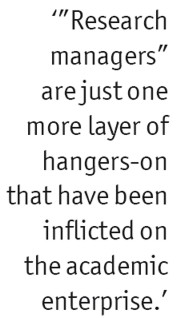
|
Kerridge’s article didn’t help much either. He seems to think that research managers are there to make that scientists fulfil “overall strategic aims of the University”. In other words they are there to make sure that scientists obey the orders of non-scientists (or elderly ex-scientists) who claim to know what the future holds. I can think of no better way to ruin the scientific reputation of a university and to stifle creativity.
We all appreciate good support. We used to have a very helpful person in the department (not a ‘manager’) who could advise on some of the financial intricacies, but now it is run by a ‘manager’ it has been centralised, depersonalised and it is far less efficient.
The fact of the matter seems to be that “research managers” are just one more layer of hangers-on that have been inflicted on the academic enterprise during the time new labour was in power. They are certainly not alone. We have now have “research facilitators” and offshoots of HR running nonsense courses in things like Brain Gym [2]. All of these people claim they are there to support research. They do no such thing. They merely generate more paper work and more distraction from the job in hand. Take a simple example. At a time when there was a redundancy committee in existence to decide which academics should be fired in my own faculty, the HR department advertised two jobs (on near professorial salaries) for people trained in neurolinguistic programming (that is a well-known sort of pseudo-scientific psychobabble, but it’s big business [3]).
A quick look at what research managers actually do (in two research-intensive universities) shows that mostly they send emails that list funding agencies, and to forward emails you already had from someone else. Almost all of it can be found more conveniently by a couple of minutes with Google. Although they claim to reduce administrative work for scientists, it is usually quicker to do it yourself than to try to explain things to people who don’t understand the science. They don’t save work, they make it.
One might well ask how it is that so much money has come to be spent on pseudo-jobs like “research managers”. I can only guess that it is part of the ever-expanding tide of administrative junk that encumbers the work of people who are trying to do good creative science. It also arises from the misapprehension, widespread among vice-chancellors, that you can get creative science by top down management of research by people who know little about it.
I’m reminded of the words of the “unrepentant capitalist”, Luke Johnson [4] (he was talking about HR but the words apply equally here).
“HR is like many parts of modern businesses: a simple expense, and a burden on the backs of the productive workers”,
“They don’t sell or produce: they consume. They are the amorphous support services”.
“I have radically downsized HR in several companies I have run, and business has gone all the better for it.”
The dangers are illustrated by the report [5] of a paper by the professor of higher education management at Royal Holloway (yes, we already have a chair in this non-subject). It seems that “Research "can no longer be left to the whims and fortunes of individual academics" “. It must be left to people who don’t do research or understand it. It’s hard to imagine any greater corruption of the academic enterprise.
Oddly enough, the dire financial situation brought about by incompetent and greedy bankers provides an opportunity for universities to shed the myriad hangers-on that have accreted round the business of research. Savings will have to be made, and it’s obvious that they shouldn’t start with the people who do the teaching and research on which the reputation of the university depends. With luck, it may not be too late to choke off the this new phenomenon before it chokes us. If you want research, spend money on people who do it, not those who talk about it.
[1] Association of Research Managers and Administrators http://www.arma.ac.uk/about/
[2] When HR gets hold of academe, quackery and gobbledegook run riot. Times Higher Education 10 April 2008, http://www.timeshighereducation.co.uk/story.asp?sectioncode=26&storycode=401385 and expanded version at https://www.dcscience.net/?p=226
[3] What universities can do without. http://ucllifesciences.wordpress.com/2010/04/25/what-universities-can-do-without/
[4] Luke Johnson The Truth About the HR Department, Financial Times, Jnauary 30 2008 http://www.ft.com/cms/s/0/9e10714c-ced7-11dc-877a-000077b07658.html and https://www.dcscience.net/?p=226
[5] Managers must be qualified to herd the academic cats. Times Higher Education 20 May 2010 http://www.timeshighereducation.co.uk/story.asp?sectioncode=26&storycode=411643
Follow-up
There is something very offensive about the idea that a ‘bachelor of science’ degree can be awarded by a university, as a prize for memorising gobbledygook.
Once the contents of the ‘degrees’ has been exposed to public ridicule, many universities have stopped doing it. All (or nearly all) of these pseudo-degrees have closed at the University of Salford, the University of Central Lancashire, Robert Gordon University, the University of Buckingham, and even at the University of Westminster (the worst offender), one course has closed (with rumours of more to follow).
|
I’ve already written about the course in Traditional Chinese Medicine at the University of Salford (Chinese medicine -acupuncture gobbledygook revealed) and at the University of Westminster: see Why degrees in Chinese medicine are a danger to patients. The former has closed, but not the latter. Here is another one. One place that has yet to come under close scrutiny is Middlesex University. |
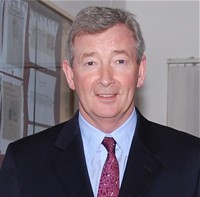
Michael Driscoll, VC of Middlesex University. The buck stops with him. |
Their “Complementary Health” courses are as follows (April 2010).
- Complementary Health Sciences (Ayurveda) Degree, BSc Honours
- Herbal Medicine Degree, BSc Honours
- Traditional Chinese Acupuncture Degree, BSc Honours
- Traditional Chinese Medicine Degree, BSc Honours
and also two postgraduate courses
I asked Middlesex University for samples of their teaching materials under the Freedom of Information Act, and, as usual, the request was refused. As usual, I then asked for the mandatory internal review of the decision, and this time, most unusually, the internal review did not confirm the initial refusal and I was sent a bundle of teaching materials about Chinese Herbal Medicine, It was not all I asked for, but it is quite enough to show the absurd ideas that are still being taught as part of bachelor of Science degree in a UK University.
Not only are the ideas absurd, pre-scientific, indeed antiscientific. They are also dangerous. People who have been taught this nonsense are going out and being let loose on sick people.
The vice-chancellor of Middlesex University, Professor Michael Driscoll, is an economist, not a biologist. Surely you don’t need to be a scientist to feel a bit suspicious when you read on the Middlesex web site about
Traditional Chinese Acupuncture and Moxibustion including distribution of meridians-collaterals and location of acupoints; needling and moxibustion techniques;
Have any of the members of the Executive ever thought to ask about what goes on in these courses? Even if it is beyond an economist to see through the nonsense, surely it should be possible for Professor Margaret House, Deputy Vice-Chancellor Academic, whose interests lie in water quality, should be able to, though as Dean of the School of Health and Social Sciences she appears to sponsor the nonsense. And Professor Waqar Ahmad, Deputy Vice-Chancellor Research and Enterprise, who has written a s book on Ethnicity, Health and Health Care, should surely be able to distinguish sense from nonsense in health care? In that respect, I’d have less confidence in Katie Bell, Chief Marketing Officer, who joined Middlesex University in 2009 following a career in brand marketing for Nestlé UK and GlaxoSmithKline Consumer Healthcare. Marketing people seldom have much regard for truth.
Have any of the University’s Governors ever asked what is going on in their name? It’s true that none of the long list of distinguished-sounding governors is a scientist. Surely you don’t need to be to question whether or not what follows can be described as ‘science’.
My guess is that none of these distinguished people has ever bothered to look at the dangerous nonsense that is being taught in their University. It is not in the nature of ‘managers’ to look far beyond ticked-boxes and profit, They should have done of course, but to make it easier for them, here is a small selection of the slides that I was sent (the copyright for them lies with the university: these few slides come under the heading ‘ ‘fair quotation’ and it is undoubtedly in the public interest to show them).
Course CMH 1211
e 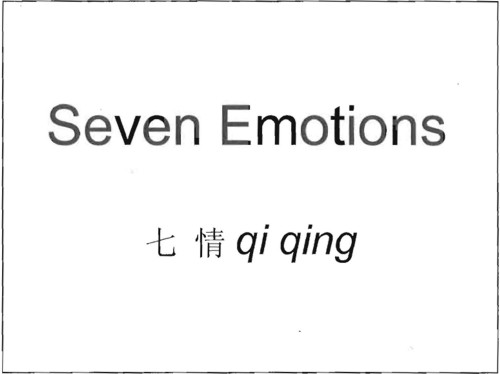
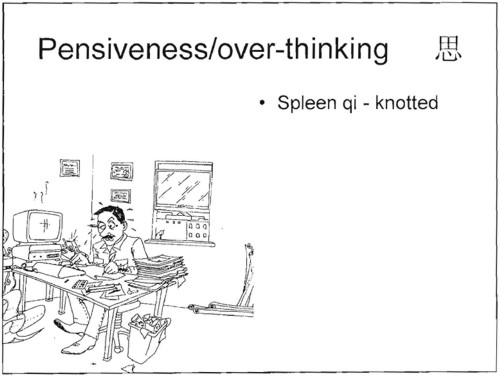
Uhuh, my spleen qi is well and truly knotted already though when I learned physiology it was not thought that the spleen had much to do with emotions.
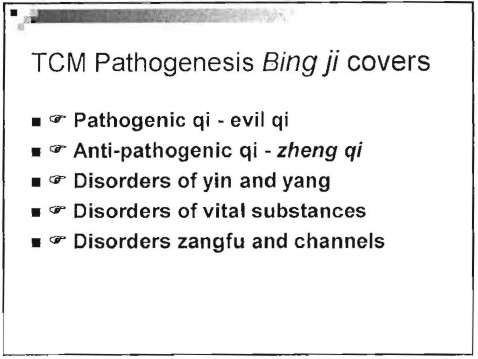
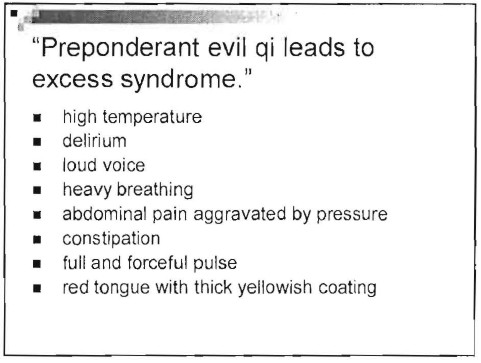
Ah so at least the problem of heavy breathers is solved. But high temperature, abdominal pain and abnormal pulse can be signs of serious illness. If your only explanation for them is “preponderant evil Qi”, you are a menace to public health.
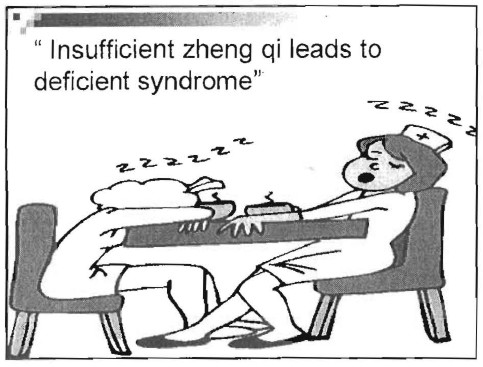
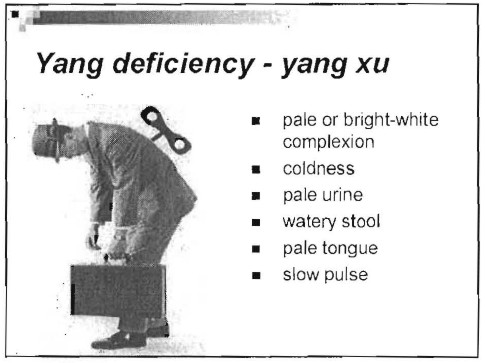
All these symptoms could be the result of a serious disease. It is not only antiquated nonsense to talk about them in terms of Yin, Yang and Qi. It endangers people,
Course CMH 2212
Chinese materia medica. Some of the herbs are likely to contain active ingredients (indeed some are very dangerous). It would be quite possible to study the ingredients of these herbs and to investigate how they work in the light of what has been learned about physiology and pharmacology in the last 200 years. Pharmacology has a long history of doing that, But is seems to play no part in this course. Herbs are “cold” or “hot” and may “check the exuberance of yang”.
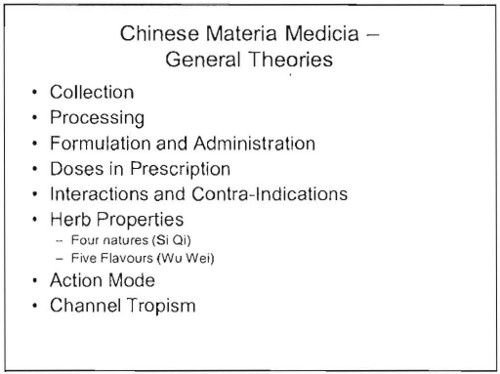
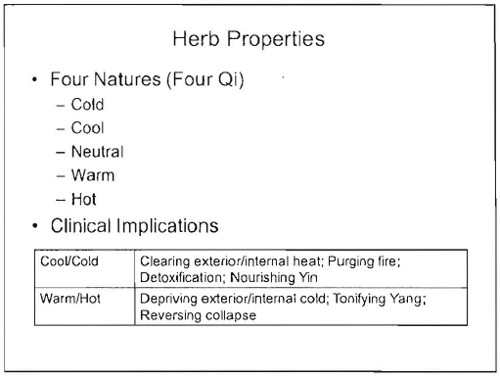
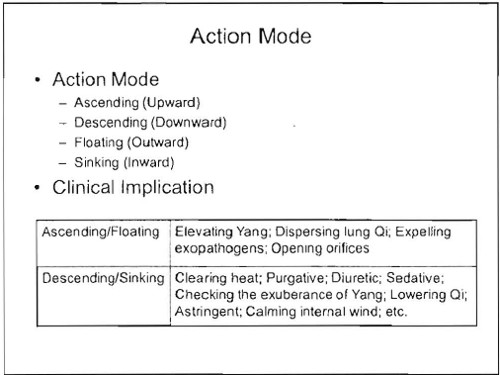
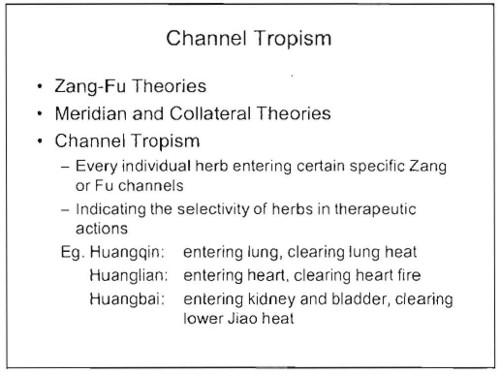
and so on, just preposterous, made-up nonsense from another era.
If it were taught as cultural history, it might be interesting. But it is being taught as though it were true, and an appropriate way to treat sick people.
Course CMH 3214
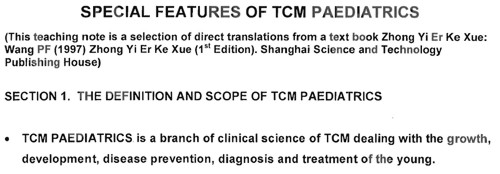


Would you trust your child to someone who’d been taught that “causes of paediatric diseases are relatively simple”, and “children are pure yang”?
Now some Chinese recipes
Course CMH 3100
![]()

This may or may not taste good, but to recommend it for diabetes is seriously irresponsible.

The programme specification for the “BSc (Hons) Traditonal Chinese medicine” can be found here. [local copy download]
It is written with all the official trappings, just as though the degree was about science. It isn’t. It is a danger to public health.
I have asked the vice-chancellor, Michael Driscoll, to express his view of these comments
Follow-up
A rather unexpected comment from a London acupuncturist.
“At least,I knew that Professor David Colquhoun is very skeptical about Chinese medicine. he comment Chinese medicine study”not only are the ideas absurd, pre-scientific, indeed antiscientific. They are also dangerous. People who have been taught this nonsense are going out and being let loose on sick people.” “
“But,I still like to read his blog as His article very is respectable. I think. Look this…”
The skeptic blog featured this post in its weekly roundup.
27 May 2010. Times Higher Education reported the decision of Middlesex University to close its philosophy department. This department seems to have a remarkable reputation, not least for a post-1992 university. Three academics and four students have been suspended and gagged in classical bullying style.
This has happened while they continue to teach dangerous rubbish like that described above.
I left a comment at Times Higher, as follows.
It is a reflection on the quality of university management that Middlesex has chosen to shut its philosophy department while continuing to run degrees in quackery. These courses not only offer an Hons BSc for memorising chunks of anti-scientific nonsense. They also pose a real danger to patients. See https://www.dcscience.net/?p=2923
I can think of no better illustration than this of the crass nature of the judgements made by Middlesex’s management. They are either ignorant of what constitutes science, or they are corrupt. I see no other possibilities. In either case they should not be running a university.
I think Prof Michael Driscoll owes the world an explanation.
Yet another university has stopped its homeopathy course. The particular interest of this course was that it was being run at Robert Gordon University, Aberdeen, the vice-chancellor which was Michael Pittilo, until his recent premature death. Pittilo is the person who recommended to the government that herbalists and Chinese medicine practitioners should get honours degrees and be regulated like doctors. His report, was, in my opinions, disastrously bad.
It recently emerged that this, very bad, advice would not be accepted by the Department of Health (DH), so the campaign against the Pittilo proposals, on this blog and elsewhere was successful. The alternative DH proposals look pretty silly, but we won’t really know until after the election exactly what will happen.
Robert Gordon University (RGU): is the ‘post-1992’ university in Aberdeen, as opposed the the University of Aberdeen (where my son is at the moment). Much of RGU does an excellent job, but like so many post-1992 universities they harm themselves by running courses in barmy alternative medicine. RGU ran an Introduction To Homeopathy module (saved 9 April 2010).
In July 2009, I asked RGU to see some samples of the teaching materials on this module, partly as part of the campaign against Pittilo’s proposals. I asked to see the powerpoints and handouts for three lectures, (1) evidence for homeopathy, (2) first aid remedies, and (3) allergies.
In September 2009, this request, made under the Freedom of Information Act (Scotland), was, as always, rejected by RGU, though they did tell me that the evidence lecture had been produced by a lecturer from The Faculty of Homeopathy and the other two had been produced by a local GP.
So, as usual, I asked for the mandatory internal review of the decision. In October, the review upheld the original decision, as they almost always do. I referred the decision to the Scottish Information Commissioner (the law is slightly different in Scotland) and they have still not responded.
But on 8 April 2010 I got a letter from RGU.
|
“The above course requested is no longer part of the School of Nursing and Midwifery’s provision, and it was cessated [sic] in Semester One 2009/10. This followed a formal review of all Nursing and Midwifery modules and their viability. In the light of this the university has decided to release the information.” |
So yet another university has done the sensible thing. The course has been shut. Just for the record, I’ll reproduce a few of the slides from the lecture on “homeopathic remedies for allergies”.
Allergies can be dangerous, and occasionally lethal. To treat them with homeopathic pills, medicines that contain no medicine, is not just delusion, but a dangerous delusion which risks the lives of patients.
The "remedies" include nettles, sulphur, petroleum and arsenic. They’d be pretty scary but in fact the pills contain, in most cases, not a jot of nettle, sulphur, petroleum or arsenic. Homeopathic pharmacies stock thousands of bottles of identical sugar pills, each with a different label.
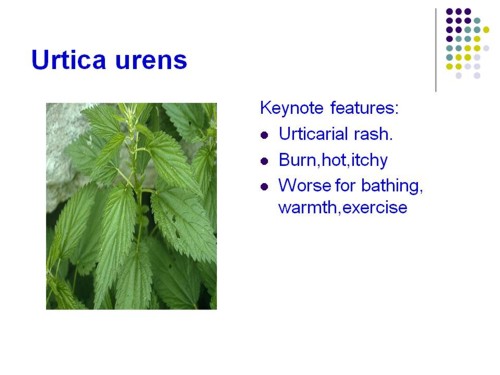
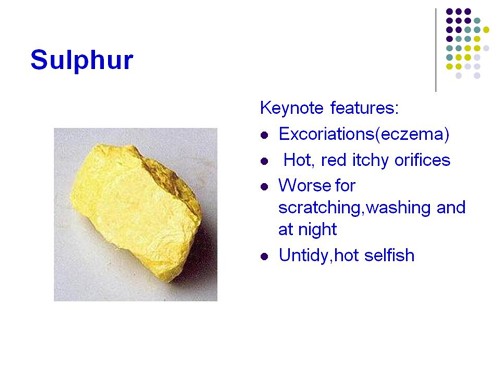

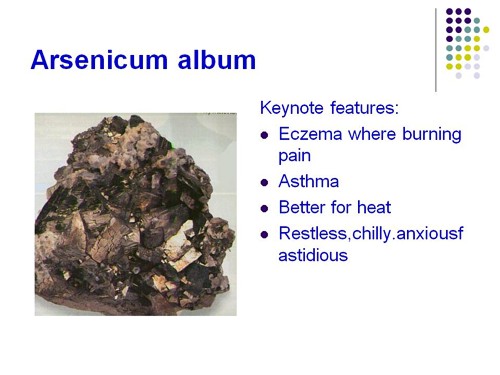
These dangerous delusions were being taught as fact in a UK university. The shame of it..
This post recounts a complicated story that started in January 2009, but has recently come to what looks like a happy ending. The story involves over a year’s writing of letters and meetings, but for those not interested in the details, I’ll start with a synopsis.
Synopsis of the synopsis
In January 2009, a course in "integrated medicine" was announced that, it was said, would be accredited by the University of Buckingham. The course was to be led by Drs Rosy Daniel and Mark Atkinson. So I sent an assessment of Rosy Daniel’s claims to "heal" cancer to Buckingham’s VC (president), Terence Kealey, After meeting Karol Sikora and Rosy Daniel, I sent an analysis of the course tutors to Kealey who promptly demoted Daniel, and put Prof Andrew Miles in charge of the course. The course went ahead in September 2009. Despite Miles’ efforts, the content was found to be altogether too alternative. The University of Buckingham has now terminated its contract with the "Faculty of Integrated Medicine", and the course will close. Well done.Buckingham.
Synopsis
- January 2009. I saw an announcement of a Diploma in Integrated Medicine, to be accredited by the University of Buckingham (UB). The course was to be run by Drs Rosy Daniel and Mark Atkinson of the College of Integrated Medicine, under the nominal directorship of Karol Sikora (UB’s Dean of Medicine). I wrote to Buckingham’s vice-chancellor (president), Terence Kealey, and attached a reprint of Ernst’s paper on carctol, a herbal cancer ‘remedy’ favoured by Daniiel.
- Unlike most vice-chancellors, Kealey replied at once and asked me to meet Sikora and Daniel. I met first Sikora alone, and then, on March 19 2009, both together. Rosy Daniel gave me a complete list of the speakers she’d chosen. Most were well-known alternative people, some, in my view, the worst sort of quack. After discovering who was to teach on the proposed course, I wrote a long document about the proposed speakers and sent it to the vice-chancellor of the University of Buckingham, Terence Kealey on March 23rd 2009.. Unlike most VCs, he took it seriously. At the end of this meeting I asked Sikora, who was in nominal charge of the course, how many of the proposed tutors he’d heard of. The answer was "none of them"
- Shortly before this meeting, I submitted a complaint to Trading Standards about Rosy Daniel’s commercial site, HealthCreation, for what seemed to me to be breaches of the Cancer Act 1939, by claims made for Carctol. Read the complaint.
- On 27th April 2009, I heard from Kealey that he’d demoted Rosy Daniel from being in charge of the Diploma and appointed Andrew Miles, who had recently been appointed as Buckingham’s Professor of Public Health Education and Policy &Associate Dean of Medicine (Public Health). Terence Kealey said "You’ve done us a good turn, and I’m grateful". Much appreciated. Miles said the course “needs in my view a fundamental reform of content. . . “
- Although Rosy Daniel had been demoted, she was still in charge of delivering the course at what had, by this time, changed its name to the Faculty of Integrated Medicine which, despite its name, is not part of the university.
- Throughout the summer I met Miles (of whom more below) several times and exchanged countless emails, but still didn’t get the revised list of speakers. The course went ahead on 30 September 2009. He also talked with Michael Baum and Edzard Ernst.
- By January 2010, Miles came to accept that the course was too high on quackery to be a credit to the university, and simply fired The Faculty of Integrated Medicine. Their contract was not renewed. Inspection of the speakers, even after revision of the course, shows why.
- As a consequence, it is rumoured that Daniel is trying to sell the course to someone else. The University of Middlesex, and unbelievably, the University of Bristol, have been mentioned, as well as Thames Valley University, the University of Westminster, the University of Southampton and the University of East London. Will the VCs of these institutions not learn something from Buckingham’s experience? It is to be hoped that they would at the very least approach Buckingham to ask pertinent questions? But perhaps a more likely contender for an organisation with sufficient gullibility is the Prince of Wales newly announced College of Integrated Medicine. [but see stop press]
The details of the story
The University of Buckingham (UB) is the only private university in the UK. Recently it announced its intention to start a school of medicine (the undergraduate component is due to start in September 2011). The dean of the new school is Karol Sikora.
Karol Sikora shot to fame after he appeared in a commercial in the USA. The TV commercial was sponsored by a far-right Republican campaign group, “Conservatives for Patients’ Rights” It designed to prevent the election of Barack Obama, by pouring scorn on the National Health Serrvice. A very curious performance. Very curious indeed. And then there was a bit of disagreement about the titles that he claimed to have.
As well as being dean of medicine at UB. Karol Sikora is also medical research director of CancerPartnersUK. a private cancer treatment company. He must be a very busy man.
Karol Sikora’s attitude to quackery is a mystery wrapped in an enigma. As well as being a regular oncologist, he is also a Foundation Fellow of that well known source of unreliable information, The Prince of Wales Foundation for Integrated Health. He spoke at their 2009 conference.
In the light of that, perhaps it is not, after all, so surprising thet the first action of UB’s medical school was to accredit a course a Diploma in Integrated Medicine. This course has been through two incarnations. The first prospectus (created 21 January 2009) advertised the course as being run by the British College of Integrated Medicine.But by the time that UB issued a press release in July 2009, the accredited outfit had changed its name to the Faculty of Integrated Medicine That grand title makes it sound like part of a university. It isn’t.
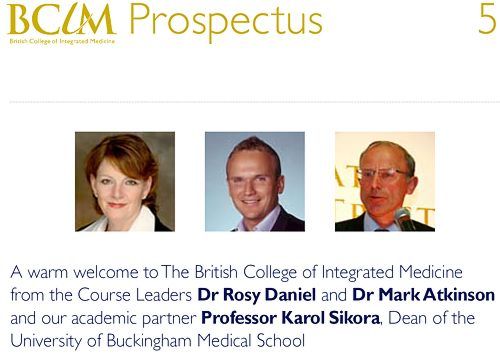
Rosy Daniel runs a company, Health Creation which, among other things, recommended a herbal concoction. Carctol. to "heal" cancer, . I wrote to Buckingham’s vice-chancellor (president), Terence Kealey, and attached a reprint of Ernst’s paper on Carctol. . Unlike most university vice-chancellors, he took it seriously. He asked me to meet Karol Sikora and Rosy Daniel to discuss it. After discovering who was teaching on this course, I wrote a document about their backgrounds and sent it to Terence Kealey. The outcome was that he removed Rosy Daniel as course director and appointed in her place Andrew Miles, with a brief to reorganise the course. A new prospectus, dated 4 September 2009, appeared. The course is not changed as much as I’d have hoped, although Miles assures me that while the lecture titles themselves may not have changed, he had ordered fundamental revisions to the teaching content and the teaching emphases.
In the new prospectus the British College of Integrated Medicine has been renamed as the Faculty of Integrated Medicine, but it appears to be otherwise unchanged. That’s a smart bit of PR. The word : “Faculty” makes it sound as though the college is part of a university. It isn’t. The "Faculty" occupies some space in the Apthorp Centre in Bath, which houses, among other things, Chiropract, Craniopathy (!) and a holistic vet,
The prospectus now starts thus.
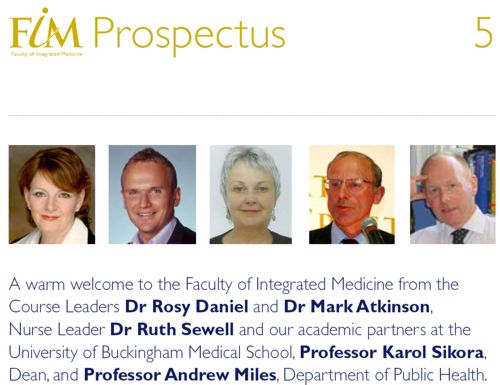
The Advisory Board consists largely of well-know advocates of alternative medicine (more information about them below).
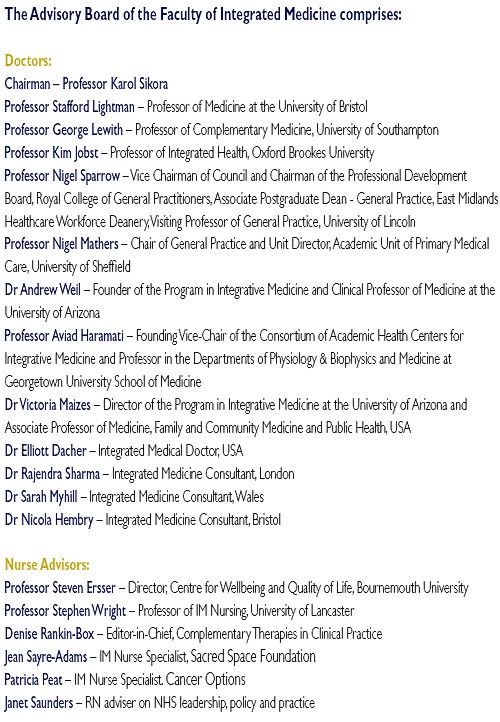
Most of these advisory board members are the usual promoters of magic medicine. But three of them seem quite surprising,Stafford Lightman, Nigel Sparrow and Nigel Mathers.
Stafford Lightman? Well actually I mentioned to him in April that his name was there and he asked for it to be removed, on the grounds that he’d had nothing to do with the course. It wasn’t removed for quite a while, but the current advisory board has none of these people. Nigel Sparrow and Nigel Mathers, as well as Lightman, sent letters of formal complaint to Miles and Terence Kealey, the VC of Buckingham, to complain that their involvement in Rosy Daniel’s set-up had been fundamentally misrepresented by Daniel. With these good scientists having extricated themselves from Daniel’s organisation, the FIM has only people who are firmly in the alternative camp (or quackery, as i’d prefer to call it). For example, people like Andrew Weil and George Lewith.
Andrew Weil, for example, while giving his address as the University of Arizona, is primarily a supplement salesman. He was recently reprimanded by the US Food and Drugs Administration
“Advertising on the site, the agencies said in the Oct. 15 letter, says “Dr. Weil’s Immune Support Formula can help maintain a strong defense against the flu” and claims it has “demonstrated both antiviral and immune-boosting effects in scientific investigation.”
The claims are not true, the letter said, noting the “product has not been approved, cleared, or otherwise authorized by FDA for use in the diagnosis, mitigation, prevention, treatment, or cure of the H1N1 flu virus.”
This isn’t the first time I’ve come across people’s names being used to support alternative medicine without the consent of the alleged supporter. There was, for example, the strange case of Dr John Marks and Patrick Holford.
Misrepresentation of this nature seems to be the order of the day. Could it be that people like Rosy Daniel are so insecure or, indeed, so unimportant within the Academy in real terms (where is there evidence of her objective scholarly or clinical stature?), that they seek to attach themselves, rather like limpets to fishing boats, to people of real stature and reputation, in order to boost their own or others’ view of themselves by a manner of proxy?
The background
When the course was originally proposed, a brochure appeared. It said accreditation by the University of Buckingham was expected soon.
Not much detail appeared in the brochure, Fine words are easy to write but what matters is who is doing th teaching. So I wrote to the vice-chancellor of Buckingham, Terence Kealey. I attached a reprint of Ernst’s paper on carctol, a herbal cancer ‘remedy’ favoured by Daniel (download the cached version of her claims, now deleted).
Terence Kealey
Kealey is regarded in much of academia as a far-right maverick, because he advocates ideas such as science research should get no public funding,and that universities should charge full whack for student fees. He has, in fact, publicly welcomed the horrific cuts being imposed on the Academy by Lord Mandelson. His piece in The Times started
“Wonderful news. The Government yesterday cut half a billion pounds from the money it gives to universities”
though the first comment on it starts
"Considerable accomplishment: to pack all these logical fallacies and bad metaphors in only 400 words"
He and I are probably at opposite ends of the political spectrum. Yet he is the only VC who has been willing to talk about questions like this. Normally letters to vice-chancellors about junk degrees go unanswered. Not so with Kealey. I may disagree with a lot of his ideas, but he is certainly someone you can do business with.
Kealey responded quickly to my letter, sent in January 2009, pointing out that Rosy Daniel’s claims about Carctol could not be supported and were possibly illegal. He asked me to meet Sikora and Daniel. I met first Sikora alone, and then, on March 19 2009, both together. Rosy Daniel gave me a complete list of the speakers she’d chosen to teach on this new Diploma on IM.
After discovering who was to teach on the proposed course, I wrote a long document about the proposed speakers and sent it to Terence Kealey on March 23rd 2009. It contained many names that will be familiar to anyone who has taken an interest in crackpot medicine, combined with a surprisingly large element of vested financial interests. Unlike most VCs, Kealey took it seriously.
The remarkable thing about this meeting was that I asked Sikora how many names where familiar to him on the list of people who had been chosen by Rosy Daniel to teach on the course. His answer was "none of them". Since his name and picture feature in all the course descriptions, this seemed like dereliction of duty to me.
After seeing my analysis of the speakers, Terence Kealey reacted with admirable speed. He withdrew the original brochure, demoted Rosy Daniel (in principle anyway) and brought in Prof Andrew Miles to take responsibility for the course. This meant that he had to investigate the multiple conflicts of interests of the various speakers and to establish some sort of way forward in the ‘mess’ of what had been agreed before Miles’ appointment to Buckingham
Andrew Miles.
Miles is an interesting character, a postdoctoral neuroendocrinologist, turned public health scientist. I’d come across him before as editor-in-chief of the Journal of Evaluation in Clinical Practice This is a curious journal that is devoted mainly to condemning Evidence Based Medicine. Much of its content seems to be in a style that I can only describe as post-modernist-influenced libertarian.
The argument turns on what you mean by ‘evidence’ and, in my opinion, Miles underestimates greatly the crucial problem of causality, a problem that can be solved only by randomisation, His recent views on the topic can be read here.
An article in Miles’ journal gives its flavour: "Andrew Miles, Michael Loughlin and Andreas Polychronis, Medicine and evidence: knowledge and action in clinical practice". Journal of Evaluation in Clinical Practice 2007, 13, 481–503 [download pdf]. This paper launches an attack on Ben Goldacre, in the following passage.
“Loughlin identifies Goldacre [36] as a particularly luminous example of a commentator who is able not only to combine audacity with outrage, but who in a very real way succeeds in manufacturing a sense of having been personally offended by the article in question. Such moralistic posturing acts as a defence mechanism to protect cherished assumptions from rational scrutiny and indeed to enable adherents to appropriate the ‘moral high ground’, as well as the language of ‘reason’ and ‘science’ as the exclusive property of their own favoured approaches. Loughlin brings out the Orwellian nature of this manoeuvre and identifies a significant implication.”
"If Goldacre and others really are engaged in posturing then their primary offence, at least according to the Sartrean perspective adopted by Murray et al. is not primarily intellectual, but rather it is moral. Far from there being a moral requirement to ‘bend a knee’ at the EBM altar, to do so is to violate one’s primary duty as an autonomous being.”
This attack on one of my heroes was occasioned because he featured one of the most absurd pieces of post-modernist bollocks ever, in his Guardian column in 2006. I had a go at the same paper on this blog, as well as an earlier one by Christine Barry, along the same lines. There was some hilarious follow-up on badscience.net. After this, it is understandable that I had not conceived a high opinion of Andrew Miles. I feared that Kealey might have been jumping out of the frying pan into the fire.
After closer acquaintance I have changed my mind, In the present saga Andrew Miles has done an excellent job. He started of sending me links to heaven knows how many papers on medical epistemology, to Papal Encyclicals on the proposed relationship between Faith and Reason and on more than one occasion articles from the Catholic Herald (yes, I did read it). This is not entirely surprising, as Miles is a Catholic priest as well as a public health academic, so has two axes to grind. But after six months of talking, he now sends me links to junk science sites of the sort that I might get from, ahem, Ben Goldacre.
Teachers on the course
Despite Andrew Miles best efforts, he came in too late to prevent much of the teaching being done in the parallel universe of alternative medicine, The University of Buckingham had a pre-Miles, legally-binding contract (now terminated) with the Faculty of Integrated Medicine, and the latter is run by Dr Rosy Daniel and Dr Mark Atkinson. Let’s take a look at their record.
Rosy Daniel BSc, MBBCh
Dr Rosy Daniel first came to my attention through her commercial web site, Health Creation. This site, among other things, promoted an untested herbal concoction, Carctol, for "healing" cancer.
Carctol: Profit before Patients? is a review by Edzard Ernst of the literature, such as it is, and concludes
Carctol and the media hype surrounding it must have given many cancer patients hope. The question is whether this is a good or a bad thing. On the one hand, all good clinicians should inspire their patients with hope [6]. On the other hand, giving hope on false pretences is cruel and unethical. Rosy Daniel rightly points out that all science begins with observations [5]. But all science then swiftly moves on and tests hypotheses. In the case of Carctol, over 20 years of experience in India and almost one decade of experience in the UK should be ample time to do this. Yet, we still have no data. Even the small number of apparently spectacular cases observed by Dr. Daniel have not been published in the medical literature.
On this basis I referred Health Creation to Trading Standards officer for a prima facie breach of the Cancer Act 1939. ]Download the complaint document]. Although no prosecution was brought by Trading Standards, they did request changes in the claims that were being made. Here is an example.
A Google search of the Health Creation site for “Carctol” gives a link
Dr Daniel has prescribed Carctol for years and now feels she is seeing a breakthrough. Dr Daniel now wants scientists to research the new herbal medicine
But going to the link produces
Access denied.
You are not authorized to access this page.
You can download the cached version of this page, which shows the sort of claims that were being made before Trading Standards Officers stepped in. There are now only a few oblique references to Carctol on the Health Creation site, e.g. here..
Both Rosy Daniel and Karol Sikora were speakers at the 2009 Princes’s Foundation Conference, in some odd company.
Mark Atkinson MBBS BSc (Hons) FRIPH
Dr Mark Atkinson is co-leader of the FiM course. He is also a supplement salesman, and he has promoted the Q-link pendant. The Q-link pendant is a simple and obvious fraud designed to exploit paranoia about WiFi killing you. When Ben Goldacre bought one and opened it. He found
“No microchip. A coil connected to nothing. And a zero-ohm resistor, which costs half a penny, and is connected to nothing.”
Nevertheless, Mark Atkinson has waxed lyrical about this component-free device.
“As someone who used to get tired sitting in front of computers and used to worry about the detrimental effects of external EMF’s, particularly as an avid user of mobile phones, I decided to research the various devices and technologies on the market that claim to strengthen the body’s subtle energy fields. It was Q Link that came out top. As a Q link wearer, I no longer get tired whilst at my computer, plus I’m enjoying noticeably higher energy levels and improved mental performance as a result of wearing my Q Link. I highly recommend it.” Dr Mark Atkinson, Holistic Medical Physician
Mark Atkinson is also a fan of Emo-trance. He wrote, In Now Magazine,
"I wanted you to know that of all the therapies I’ve trained in and approaches that I have used (and there’s been a lot) none have excited me and touched me so deeply than Emotrance."
"Silvia Hartmann’s technique is based on focusing your thoughts on parts of your body and guiding energy. It can be used for everything from insomnia to stress. The good news is that EmoTrance shows you how to free yourself from these stuck emotions and release the considerable amounts of energy that are lost to them."
Aha so this particular form of psychobabble is the invention of Silvia Hartmann. Silvia Hartmann came to my attention because her works feature heavily in on of the University of Westminster’s barmier “BSc” degrees, in ‘naturopaths’, described here. She is fanous, apart from Emo-trance, for her book Magic, Spells and Potions
“Dr Hartmann has created techniques that will finally make magic work for you in ways you never believed to be possible.”
Times Higher Education printed a piece with the title ‘Energy therapy’ project in school denounced as ‘psychobabble’. They’d phoned me a couple of days earlier to see whether I had an opinion about “Emotrance”. As it happens, I knew a bit about it because it had cropped up in a course given at, guess where, the University of Westminster . It seems that a secondary school had bought this extreme form of psychobabble. The comments on the Times Higher piece were unusually long and interesting.
It turned out that the inventor of “Emotrance”, Dr Silvia Hartmann PhD., not only wrote books about magic spells and potions, but also that her much vaunted doctorate had been bought from the Universal Life Church, current cost $29.99.
The rest of the teachers
The rest of the teachers on the course, despite valiant attempts at vetting by Andrew Miles, includes many names only too well-known to anybody who has taken and interest in pseudo-scientific medicine. Here are some of them.
Damien Downing:, even the Daily Mail sees through him. Enough said.
Kim Jobst, homoepath and endorser of the obviously fraudulent Q-link
pendant. His Plaxo profile says
About Kim A. Jobst
Consultant, Wholystic Care Physician [sic!] , Medical Homoeopath, Specialist in Neurodegeneration and Dementia, using food state nutrition, diet and lifestyle to facilitate Healing and Growth;
Catherine Zollman, Well known ally of HRH and purveyer of woo.
Harald Walach, another homeopath, fond of talking nonsense about "quantum effects".
Nicola Hembry, a make-believe nutritionist and advocate of vitamin C and laetrile for cancer
Simon Mills, a herbalist who is inclined to diagnoses like “hot damp”, ro be treated with herbs that tend to “cool and dry.”
David Peters, of the University of Westminster. Enough said.
Nicola Robinson of Thames Valley University. Advocate of unevidenced treatmsnts.
Michael Dixon, of whom more here.
And last but not least,
Karol Sikora.
The University of Buckingham removes accreditation of the Faculty of Integrated Medicine
The correspondence has been long and, at times, quite blunt. Here are a few quotations from it, The University of Buckingham, being private, is exempt from the Freedom of Information Act (2000) but nevertheless they have allowed me to reproduce the whole of the correspondence. The University, through its VC, Terence Keeley, has been far more open than places that are in principle subject to FOIA, but which, in practice, always try to conceal material. I may post the lot, as time permits, but meanwhile here are some extracts. They make uncomfortable reading for advocates of magic medicine.
Miles to Daniel, 8 Dec 2009
” . . . now that the University has taken his [Sikora’s] initial advice in trialing the DipSIM and has found it cost-ineffective, the way forward is therefore to alter that equation through more realistic financial contribution from IHT/FIM at Bath or to view the DipSIM as an experiment that has failed and which must give way to other more viable initiatives."
"The University is also able to confirm that we hold no interest in jointly developing any higher degrees on the study of IM with IHT/FIM at Bath. This is primarily because we are developing our own Master’s degree in Medicine of the Person in collaboration with various leading international societies and scholars including the WHO and which is based on a different school of thought. "
Miles to Daniel 15 Dec 2009
"Dear Rosy
It appears that you have not fully assimilated the content of my earlier e-mails and so I will reiterate the points I have already made to you and add to them.
The DipSIM is an external activity – in fact, it is an external collaboration and nothing more. It is not an internal activity and neither is it in any way part of the medical school and neither will it become so and so the ‘normal rules’ of academic engagement and scholarly interchange do not apply. Your status is one of external collaborator and not one of internal or even visiting academic colleague. There is no “joint pursuit” of an academically rigorous study of IM by UB and IHT/FIM beyond the DipSIM and there are no plans, and never have been, for the “joint definition of research priorities” in IM. The DipSIM has been instituted on a trial basis and this has so far shown the DipSIM to be profoundly cost-ineffective for the University. You appear to misunderstand this – deliberately or otherwise."
Daniel to Miles 13 Jan 2010
"However, I am aware that weather permitting you and Karol will be off to the Fellows meeting for the newly forming National College (for which role I nominated you to Dr Michael Dixon and Prof David Peters.)
I have been in dialogue with Michael and Boo Armstrong from FIH and they are strongly in favour of forming a partnership with FIM so that we effectively become one of many new faculties within the College (which is why we change our name to FIM some months ago).
I have told Michael about the difficulties we are having and he sincerely hopes that we can resolve them so that we can all move forward as one. "
Miles to Daniel 20 Jan 2010
"Congratulations on the likely integration of your organisation into the new College of Integrative Health which will develop out of the Prince’s Foundation for Integrated Health. This
will make an entirely appropriate home for you for the longer term.Your image of David Colquhoun "alive and kicking" as the Inquisitor General, radiating old persecutory energy and believing "priestess healers" (such as you describe youself) to be best "tortured, drowned and even burnt alive", will remain with me, I suspect, for many years to come (!). But then, as the Inquisitor General did say, ‘better to burn in this life than in the next’ (!). Overall, then, I reject your conclusion on the nature of the basis of my decision making and playfully suggest that it might form part of the next edition of Frankfurt’s recent volume ["On Bullshit] http://press.princeton.edu/titles/7929.html I hope you will forgive my injection of a little academic humour in an otherwise formal and entirely serious communication.
The nature of IM, with its foundational philosophy so vigorously opposed by mainstream medicine and the conitnuing national and international controversies which engulf homeopaths, acupuncturists, herbalists, naturopaths, transcendental meditators, therapeutic touchers, massagers, reflexologists, chiropractors, hypnotists, crystal users, yoga practitioners, aromatherapists, energy channelers, chinese medicine practitioners et al, can only bring the University difficulties as we seek to establish a formal and internationally recognised School of Medicine and School of Nursing.
I do not believe my comments in relation to governance at Bath are "offensive". They are, on the contrary, entirely accurate and of concern to the University. There have been resignations at senior level from your Board due to misrepresentation of your position and there has been a Trading Standards Authority investigation into further instances of misrepresentation. I am advised that an audit is underway of your compliance with the Authority’s instructions. You have therefore not dealt with my concerns, you have merely described them as "offensive".
I note from your e-mail that you are now in discussions with other universities and given the specific concerns of the University of Buckingham which I have dealt with exhaustively in this and other correspondences and the incompatibility of the developments at UB with the DipSIM and your own personal ambitions, etc., I believe you to have taken a very wise course and I wish you well in your negotiations. In these circumstances I feel it appropriate to enhance those negotiations by confirming that the University of Buckingham will not authorise the intake of a second cohort of students and that the relationship between IHT and the University will cease following the graduation of those members of the current course that are successful in their studies – the end of February 2011."
From Miles 2 Feb 2010
"Here is the list of teachers – you can subtract me (I withdrew from teaching when the antics ay Bath started) and also Professor John Cox (Former President of The Royal College of Psychiatrists and Former Secretary General of the World Psychiatric Association) who withdrew when he learned of some of the stuff going on…. Karol Sikora continues to teach. Michael Loughlin and Carmel Martin are both good colleagues of mine and, I can assure you – taught the students solid stuff! Michael taught medical epistemology and Carmel the emerging field of systems complexity in health services (Both of them have now withdrawn from teaching commitments).
The tutors shown are described by Rosy as the finest minds in IM teaching in the country. I interviewed tham all personally on (a) the basis of an updated CV & (b) via a 30 min telephone interview with me personally. Some were excluded from teaching because they were not qualified to do so academically (e.g. Boo Armstrong, Richard Falmer, not even a first degree, etc, etc., but gave a short presentation in a session presided over by an approved teacher) and others were approved because of their academic qualifications, PhD, MD, FRCP etc etc etc) and activity within the IM field. Each approved teacher was issued with highly specific teaching guidance form me (no bias, reference to opposing schools of thought, etc etc) and each teacher was required to complete and sign a Conflicts of Interest form. All of these documentations are with me here. Short of all this governance it’s impossible to bar them from teaching because who else would then do it?! Anyway, the end is in sight – Hallelujah! "
From Miles 19 Feb 2010
"Dear David
Just got back to the office after an excellent planning meeting for the new Master’s Degree in Person-centred Medicine and a hearty (+ alcoholic) lunch at the Ath! Since I shall never be a FRS, the Ath seems to me the next best ‘club’ (!). Michael Baum is part of the steering committee and you might like to take his thoughts on the direction of the programme. Our plans may even find their way into your Blog as an example of how to do things (vs how not to do things, i.e. CAM, IM, etc!). This new degree will sit well alongside the new degrees in Public Health – i.e. the population/utilitarian outlook of PH versus the individual person-centred approach., etc. "
And an email from a senior UB spokesperson
"Rumour has it that now that Buckingham has dismissed the ‘priestess healer of Bath’, RD [Rosy Daniel] , explorations are taking place with other universities, most of which are subject to FoI request from DC at the time of writing. Will these institutions have to make the same mistakes Buckingham did before taking the same action? Rumour also has it that RD changed the name of her institution to FIM in order to fit neatly into the Prince’s FIH, a way, no doubt, of achieving ‘protection’ and ‘accreditation’ in parallel with particularly lucrative IM ‘education’ (At £9,000 a student and with RD’s initial course attracting 20 mainly GPs, that’s £180,00 – not bad business…. And Buckingham’s ‘share of this? £12,000!”
The final bombshell; even the Prince of Wales’ FIH rejects Daniel and Atkinson?
Only today (31 March) I was sent, from a source that I can’t reveal, an email which comes from someone who "represent the College and FIH . . . ".. This makes it clear that the letter comes from the Prince of Wales’ Foundation for Integrated Health
|
Dr Rosy Daniel BSc MBBCh Director of the Faculty of Integrated Medicine Medical Director Health Creation 30th March 2010 RE: Your discussion paper and recent correspondence Thank you for meeting with [XXXXXX] and myself this evening to discuss your proposals concerning a future relationship between your Faculty of Integrated Medicine and the new College. As you know, he and I have been asked to represent the College and FIH in this matter. We are aware of difficulties facing your organisations and the FIM DipSIM course. As a consequence of these, it is not possible for the College to enter into an association with you, any of your organisations nor the DipSIM course at the present time. It would, therefore, be wrong to represent to others that any such association has been agreed. You will appreciate that, in these circumstances, you will not receive an invitation to the meeting of 15th April 2010 nor to other planned events. I am sorry to disappoint you in this matter. Yours sincerely |
Conclusions
I’ll confess to feeling almost a little guilty for having appeared to persecute the particular individuals involved in thie episode. But patients are involved and so is the law, and both of these are more important than individuals, The only unfair aspect is that, while it seems that even the Prince of Wales’ Foundation for Integrated Health has rejected Daniel and Atkinson, that Foundation embraces plenty of people who are just as deluded, and potentially dangerous, as those two. The answer to that problem is for the Prince to stop endorsing treatments that don’t work.
As for the University of Buckingham. Well, despite the ‘right wing maverick’ Kealey and the ‘anti-evidence’ Miles, I really think they’ve done the right thing. They’ve listened, they’ve maintained academic rigour and they’ve released all information for which I asked and a lot more. Good for them, I say.
Follow-up
15 April 2010. This story was reported by Times Higher Education, under the title “It’s terminal for integrated medicine diploma“. That report didn’t attract comments. But on 25th April Dr Rosy Daniel replied with “‘Terminal’? We’ve only just begun“. This time there were some feisty responses. Dr Daniel really should check her facts before getting into print.
3 March 2011. Unsurprisingly, Dr Daniel is up and running again, under the name of the British College of Integrated Medicine. The only change seems to be that Mark Atkinson has jumped ship altogether, and, of course, she is now unable to claim endorsement by Buckingham, or any other university. Sadly, though, Karol Sikora seems to have learned nothing from the saga related above. He is still there as chair of the Medical Advisory Board, along with the usual suspects mentioned above.
Update 12 March. Six more dimwits signed.
An‘early day motion1 (EDM 908) has been tabled in parliament which opposes the conclusions of the science and technology committee report on the evidence for homeopathy. After two weeks it has been signed by an amazing 55 MPs. That is 8.5% of all 646 MPs. Nothing shows more clearly the scientific illiteracy that prevails in the House of Commons (and, perhaps, the results of the mass mailing of MPs by homeopaths, who are clutching at straws)..
These MPs are all people who have difficulty with the idea that pills which contain nothing can have no effect above placebo. It isn’t rocket science.
Those of us who spend quite a lot of unpaid time trying to communicate the joy of science to the public, rather resent having our efforts undermined by these members of parliament. But at least we now have a handy list of them.
In case this seems a bit harsh, it is only necessary to point out that the EDM was tabled by David Treddinick (Cons, Bosworth). Mr Treddinick is renowned as the most extreme advocate of magic medicine
in the House of Commons. The EDM twists and distorts the evidence in exactly the way the committee’s report condemned so sternly.
Nothing is too barmy for Treddinick to espouse. His education at Eton and Oxford has led him to advocate homeopathic borax for the treatment of foot and mouth disease, and he has backed homeopathic treatment of AIDS and malaria. He is a major danger to public health. By way of background, Tredinnick was suspended for a month without pay for taking a £1000 bribe in the cash for questions scandal. And he was again in trouble during the expenses scandal. It was reported that
“The MP for Bosworth struck a deal with the parliamentary standards commissioner to pay back the £755 which he claimed for a computer programme that states it can help users to predict their health via the stars.”
Yes, really, astrology! You couldn’t make it up.
One would think that, with a reputation like this, nobody with half a brain would want to sign an EDM proposed by Treddinick. Well, not so. The list of signatories is amazing, and shocking.
The state of the parties is interesting.
Unionists (Northern Ireland): no fewer than 77% (7 out of 9 MPs) signed, including the infamous Ian Paisley and the recently famous Peter Robinson. Disheartening though this is, perhaps it isn’t so surprising from a group noted for religious belief, and consequently predisposed to believing things that aren’t true.
The seriously sad thing is that second place in the stupid race is held by – wait for it – the Liberal Democrats, with 15.9% (10 of their 63 MPs). That is tragic in the light of the fact that two of the very few MPs in the House with any appreciation of evidence are also Lib Dems, Phil Willis and Evan Harris (both on the Science and Technology Committee).
After them Conservatives with 8.3% (16 out of 193), and the best is Labour 5.8% (20 out of 346 MPs)
Here is the roll of shame, updated on 12 March (the last six signed in the last 24 hours)
| Tredinnick, David | Con |
| Simpson, Alan | Lab |
| Russell, Bob | LibDem |
| Pound, Stephen | Lab |
| Dismore, Andrew | Lab |
| Simpson, David | Democratic unionist |
| McDonnell, John | Lab |
| Campbell, Gregory | Democratic unionist |
| Cohen, Harry | Lab |
| Corbyn, Jeremy | Lab |
| Drew, David | Lab |
| Gray, James | Con |
| Hancock, Mike | LibDem |
| Hermon, Lady | Ulster unionist |
| Key, Robert | Con |
| Hemming, John | LibDem |
| Bone, Peter | Con |
| Davies, Dai | Independent |
| Mates, Michael | Con |
| Dodds, Nigel | Democratic unionist |
| Wyatt, Derek | Lab |
| Sarwar, Mohammad | Lab |
| Hamilton, Fabian | Lab |
| Winterton, Nicholas | Con |
| Davies, Philip | Con |
| Leigh, Edward | Con |
| Barlow, Celia | Lab |
| Ellwood, Tobias | Con |
| Leech, John | Lib Dem |
| Main, Anne | Lab |
| Robinson, Peter | Democratic unionist |
| McCrea, Dr William | Democratic unionist |
| Paisley, Ian | Democratic unionist |
| Brady, Graham | Con |
| Cook, Frank | Lab |
| Hall, Patrick | Lab |
| Binley, Brian | Con |
| Pugh, John | Lib dem |
| Davey, Edward | Lib dem |
| Weir, Mike | Scottish Nationalist |
| Sharma, Virendra Kumar | Lab |
| Abbott, Diane | Lab |
| Williams, Mark | Lib dem |
| Horam, John | Con |
| Widdecombe, Ann | Con |
| Browne, Jeremy | Lib dem |
| Spicer, Michael | Con |
| Maclean, David | Con |
| McCafferty, Chris | Lab |
| Buck, Karen | Lab |
| George, Andrew | Lib Dem |
| Vis, Rudi | Lab |
| Walter, Robert | Lab |
| Whittingdale, John | Con |
| Farron, Timothy | Lib Dem |
I haven’t contacted most of these MPs, and of those I have only two have replied. I had a rather curt reply from one of the most surprising signatories (John Hemming, who was a Scholar in Theoretical, Atomic and Nuclear Physics at Magdalen College, Oxford.
Mark Twain’s letter
Thanks to @Count_Stuff on Twitter for reminding me about
a letter written in 1905 by Mark Twain. It refers to an Elixir of Life. By curious coincidence this popped up a week after I saw Donizetti’s L’Elisir d’Amore at ENO (and a couple of days after I bumped into its producer, Jonathan Miller, in the RADA café). I’d love to quote Kelly Rourke’s witty translation of the quack’s song, but can’t find the libretto.
Given the ludicrous libel laws in the UK. I’d like to make it clear that the following item has absolutely nothing to do with EDM 908. Please sign the petition at http://libelreform.org/
You’re an idiot of the 33rd degree
In November of 1905, an enraged Mark Twain sent this superb letter to J. H. Todd, a patent medicine salesman who had just attempted to sell bogus medicine to the author by way of a letter and leaflet delivered to his home.
|
Nov. 20. 1905
J. H. Todd Dear Sir, Your letter is an insoluble puzzle to me. The handwriting is good and exhibits considerable character, and there are even traces of intelligence in what you say, yet the letter and the accompanying advertisements profess to be the work of the same hand. The person who wrote the advertisements is without doubt the most ignorant person now alive on the planet; also without doubt he is an idiot, an idiot of the 33rd degree, and scion of an ancestral procession of idiots stretching back to the Missing Link. It puzzles me to make out how the same hand could have constructed your letter and your advertisements. Puzzles fret me, puzzles annoy me, puzzles exasperate me; and always, for a moment, they arouse in me an unkind state of mind toward the person who has puzzled me. A few moments from now my resentment will have faded and passed and I shall probably even be praying for you; but while there is yet time I hasten to wish that you may take a dose of your own poison by mistake, and enter swiftly into the damnation which you and all other patent medicine assassins have so remorselessly earned and do so richly deserve. Adieu, adieu, adieu! Mark Twain |
1 For those who are not familiar with the quaint customs of the UK parliament, early day motions can be tabled by any MP but are rarely debated and even more rarely lead to any action.
Follow-up
The Guardian had picked up on this story on the same day that it was posted, in a nice article by Ian Sample .
|
I had never intended to write about climate. It is too far from the things I know about. But recent events have unleashed a Palin-esque torrent of comments from people who clearly know even less about it than I do. In any case, it provides a good context to think about trust in science, |
My interest in it, apart from little matters like the future of the planet, lies in the reputation of science and scientists.
I have been going on for years now about the lack of trust in science, and the extent to which it is a self-inflicted problem. The latest reactions to the developments at the University of East Anglia and the IPCC may show the nature of the problem with dreadful clarity,
Many of us came into science because, apart from the sheer beauty of nature, it seemed like one of the few honest ways of earning a living. Most scientists that I know still think like that, but recent
events invite some reexamination of honesty in science.
How dishonest is science?
The first thing to say is that I have never come across anything in my own field that would qualify as fraud, or even dishonest. I did once have a visit from a rather distressed postdoc (not in my area of work) who felt pressurised by her boss into putting an interpretation on her work that she did not agree with. In the end, the bit of work in question was left out of the paper. That could be held to be dishonest, in that the omission wasn’t mentioned, but it could also be held that the omitted result was too ambiguous to contribute much to the paper. It was just short of the point where I’d have felt compelled to do something about it. But only just. That is about the worst thing I’ve encountered in a lifetime.
There is, of course, an enormous difference between being wrong and being dishonest. Any research that is worth doing has an outcome that can’t be predicted before the work is done. At best, one can hope for an approximation to the truth. Mistakes in observations, analysis or interpretation will sometimmes mean the announced result is completely wrong, with no trace of dishonesty being involved. But when that happens, others soon fiind the mistake. It is that self-correcting characteristic of science that keeps it honest in the long run.
Of course there have been occasional cases of outright fraud, simple
falsification or fabrication of data. How often it occurs is not really known. There is a recent analysis in PLoS One, about verified cases of misconduct in the USA suggested that 1 in 100,000 scientists per year are to blame, but other ways of counting give larger numbers. For example, if asked around 2 in 100 scientists claim to be aware of misconduct by someone else., The numbers aren’t huge but they are much bigger than they should be.
It isn’t perhaps surprising that the Fanelli study found misconduct was most frequent in “medical (including clinical and pharmacological) research studies”, which are often funded by the pharmaceutical industry, Basic biomedical research and other subjects were better, though sadly that could be only because they are less often offered money.
What gives rise to dishonesty?
It seems obvious that one motive is money, as suggested by the worst rates of misconduct being found in the clinical pharmacological studies, It is well known that studies funded by industry are more likely to produce results that favour the product than those funded in other ways.
The other reason is presumably the human desire to win fame, promotion and to get grants.
It is no excuse, but it is perhaps a reason for misconduct that the pressure to publish and produce results is now enormous in academia. Even in good universities people are judged by the numbers (rather than the quality) of papers they produce and by what journal they happen to be published in. Contrary to public perception, even quite senior people have no guarantee that they can’t be fired, and life for postdoctoral fellows, who do a large fraction of experimental research, is harsh to the point of cruelty. They exist on a series of short term contracts, they work exceedigly hard and have poor prospects of getting a secure job. In conditions like that, the only surprising thing is that there is so little dishonesty.
The pressure to publish in particular journals is particularly invidious because it is known that the number of citations that a paper gets (itself a fallible measure of quality) is independent of the journal in which it appears. Bibliometrists are the curse of our age. (See, for example Challenging the tyranny of impact factors, 2003; and How to get good science, 2007 or its web version; and Peter Lawrence’s article, The mismeasurement of science)
The enormous competitive pressure under which academics work is imposed by vice-chancellors, research councils and other senior people who should know better, It is a self-inflicted wound.
In other words, the authorities provide a strong incentive to do poor, over-hurried and occasionally dishonest science. Perhaps the surprising thing in the circumstances is that there is so little outright fabrication. The very measures that have the aim of improving science actually have just the opposite effect. That is what happens when science is run by people who don’t do it.
For an idea of what life is like in science now, try Peter Lawrence’s Real Lives and White Lies in the Funding of Scientific Research. Or, for someone at the other end of their career, Jennifer Rohn’s account on Nature blogs.
Given the high degree of insecurity for young researchers, compounded by well-intentioned but vacuous “training” from daft Robert’s’ "training courses", or the dismaly ineffective Concordat, the only surprise is that so many people remain honest and devoted to good science. Nothing raises the ire of hard-pressed scientists more than the constant emails form HR trying to force people to go to gobbledygook courses on "wellbeing". Times Higher Education recently did a piece on "Get happy", The comments are worth reading.
So what about climate change?
Out of thousands of pages in the IPCC reports, a single mistake was found, On page 493 of the IPCC’s second 1000-page Working Group report on “Impacts, Adaptation and Vulnerability” (WGII) it was said that Himalayan glaciers were “very likely” to disappear by 2035. Glaciers are melting but that date can’t be justified. This single mistake has been blown out of all proportion. Furthermore it is important to notice that the mistake was found by scientists, not by ‘sceptics’. It is a good example of the self-correcting nature of science. Nevertheless this single mistake has provoked something close to hysteria among those who want to deny that something needs to be done.
On the other hand, the hacked emails from the University of East Anglia (UEA) look bad. It simply isn’t possible at the moment to say whether they are as bad as they seem at first sight, We just don’t know whether anything of importance was concealed, but we should know.
One thing can be said with certainty, and that is that the reaction to their revelation by Dr Phil Jones, and by the vice-chancellor of the University of East Anglia, was nothing short of disastrous. Fred Pearce put it very well in Climate emails cannot destroy proof that humans are warming the planet
Most unforgivably of all, UEA refused to comply with requests under the Freedom of Information Act, and there is some reason to think that relevant material was deleted. The deputy information commissioner, Graham Smith, said: in a statement that
“The emails which are now public reveal that Mr Holland’s requests under the Freedom of Information Act were not dealt with as they should have been under the legislation. Section 77 of the Freedom of Information Act makes it an offence for public authorities to act so as to prevent intentionally the disclosure of requested information.”.
That seems to me to be a matter that requires the resignation of the vice-chancellor. On this matter, I think George Monbiot is spot on in his article “Climate change email scandal shames the university and requires resignations“.
There was a big feature about academic freedom in Times Higher Education recently. One of the problems was what happens to someone who brings their own university into disrepute. But when that term is used, it is always used about junior partners in the organisation (you know, professors and the like). It should apply equally to heads of communications and vice-chancellors who bring their own university into disrepute, whether the disrepute is brought about by failing to comply with the Freedom of Information Act, or by promoting courses in junk medicine.
In general, conspiracy theories are wrong. I’m not sure how much of the distortion of climate data results from surreptitious funding of opposition to doing anything by the fossil fuel industry. The Royal Society is an organisation that is not usually prone to conspiritorialist views. That means one must take it seriously the fact that in 2006, the Royal Society wrote to ExxonnMobil to ask them to stop funding climate denialist organisations. This is a bit like the way Big Pharma has been caught funding “user groups” that endorse their products. Some newspapers like to stir up controversies about things that aren’t very controversial. For example there is a good analysis of a recent Sunday Times piece here.
Of course it is often alleged that "quackbusters" are funded by Big Pharma, though in fact the amounts of money involved are far too small for Big Pharma to bother. Climate deniers too like to suggest that there is some sort of conspiracy, arranged between hundreds of labs in the world to conceal the fact that there is no such thing as warming. I guess that shows only that deniers know little about how science works. it is an exceedingly competitive business, and getting hundreds of labs to say the same thing would be like trying to herd cats.
If there is a problem, it is the other way round. Labs are in such intense competition with each other, that it lcan lead to undesirable levels of secrecy.
Blogs in which researches have a direct dialogue with the public are a big help. As always in the blogosphere, the problem is to find the reliable sources. Two excellent sites, in which scientists (not journalists or lobbyists) talk directly with the public are realclimate.org and Andrew Russell’s blog. The post on RealClimate, IPCC errors: facts and spin, is especially worth reading.
Total openness is the only cure
All the raw data and all emails have to be disclosed openly. Everything should be put on the web as soon as possible. By appearing to go to ground, UEA has made enormous problems for itself and for the rest of the world. Some people object to total openness on the grounds that the other side tells lies. In the case of climate change (and in the case of junk medicine too) that is undoubtedly true. The opponents are ruthlessly dishonest about facts. The only way to counter that is by being ruthlessly and visibly honest about what you know, and why.
The UK’s Meteorological Office has, to its great credit, put raw data on line. That policy has already paid off, because a science blogger found a mistake in the way that some Australian data had been incorporated into forecasts. The Met Office thanked him and corrected the mistake. In fact the error makes no substantial difference to the warming trend, but the principle is just great. The more people who can check analyses and eliminate slip-ups the better.
Putting raw data on the web is an idea that has been gathering force for a while, in all areas of work, not just climate change. In my own are (stochastic properties of single ion channel molecules) our analysis programs have always been available on the web, free to anyone who wants them, despite the large amount of work that has gone into them. And we run a course. almost free, on the theory that underlies our analyses. Within the last couple of months we have been discussion ways of making public all our raw data (in any case, we would always have sent it to anyone who asked). Digitised single channel records are big files (around 100 Mb) and it is only recently that the web has been able to deal with such large amounts of raw data. There are also problems of how to format data so other people can read it, The way we are all heading is clear, and the fact that some people in climate science appeared to be hiding raw data is a disgrace.
Public relations is not the cure
,
It is not uncommon to read that science needs better PR. That is precisely what is not needed. PR exists to put only one side of the story. That makes it an essentially dishonest occupation. Its aims are the very opposite of those of science. The public aren’t stupid: often they recognise when they are getting half the story.
It is particularly unfortunate that many universities have developed departments with names like "corporate communications". Externally they are seen as giving information about science, and indeed some of the things they do are successful public engagement in science. Only too often, though, it is made clear internally that an important aim of these departments is to improve the image of the university.
But you have to choose. You can engage the public in science or you can be a PR image-builder. You can’t be both.
The matter came to a head in 2008 when, according to a report in Times Higher Education, the University of Nottingham issued a memo that defined public engagement as: “The range of activities of which the primary functions are to raise awareness of the university’s capabilities, expertise and profile to those not already engaged with the institution”.
The mainstream media and political blogs
The biggest problem of all with climate change is that it has become more about politics than about facts. It has become an essential credential for any conservative to deny that climate is changing. It is part of their public image, and most conservatives neither know nor care about evidence. Like Sarah Palin, they just know. In the USA especially, the argument is not really about climate at all. It is really about discrediting Barack Obama -a sort of swift-boat treatment that uses whatever lies are needed.
Just as with the great MMR fiasco and the promotion of its false link to autism, reports in newspapers and blogs must bear much of the blame for failing to inform readers of the actual underlying facts and, just as important, the uncertainties. Of course some papers have done a pretty good job, particularly the Guardian and the Independent in the UK, and the New York Times.. The political blogs, by and large, haven’t. The Huffington Post has made little effort (and publishes some appalling nonsense about medicine too).
The problem with political blogs and tabloid newspapers is that they are much more interested in sensation and circulation than they are in giving accurate news and information. Take, for example, the Guido Fawkes blog. To be fair, the blog itself says "The primary motivation for the creation of the blog was purely to make mischief at the expense of politicians and for the author’s own self-gratification. Its writer", so you know not to expect much, Paul Staines, was at the Westminster Skeptics event, Does Political Blogging Make a Difference? He makes no pretence of taking the news seriously, which, I guess, is why I don’t read his blog. After the talks I asked why his blog did little about climate change. His answer was "where are your sandals?". On the way home I tweeted, from a very overcrowded train (most trains from Euston being cancelled that night),
"On way home from #sitp political blogging. Learned that Guido serious about nothing but Guido. Narcissist not journalist."
At least one other person there agreed (thanks, Dave Cole).
It was good to hear Sunny Hundall of Liberal Conspiracy (the only one I read), but I found myself agreeing mostly with the chair, Nick Cohen. It would be a tragedy if the great national and local papers were to vanish. Guido Fawkes and Huffington Post are not remotely like proper newspapers.
Specialist blogs like this one are fine if you are interested in the topics we write about, but we don’t begin to supplant proper newspapers. Bloggers can and do occasionally get good stories. Those that are written by scientists can analyse more critically than most journalists have either the knowledge or the time to do. Bur they don’t come close to supplanting the detailed reporting in good newspapers of local events, what happens in law courts or in parliament. That’s why it is vital to buy newspapers, not just read them free on the web.
Follow-up
James Hayton, who is in nanoscience has posted his thoughts obout trust in science on his blog. I discovered this via Twitter (@James_Hayton). He also posted a beautiful clip from the Ascent of Man, in which Jacob Bronowski speaks, from Auschwitz, of the consequences of irrational dogma. I’m old enough to remember Bronowski on a 1950s radio programme, the Brains Trust, though James Hayton clearly isn’t. Now I enjoy equally his daughter, Lisa Jardine‘s talks about science and history.
1 March 2010. Phil Jones, and the vice-chancellor of the University of East Anglia, appeared before a parliamentary committee. I found their responses to questions very disappointing. The evidence submitted by the Institute of Physics was strongly worded, but spot on.
“The CRU e-mails as published on the internet provide prima facie evidence of determined and co-ordinated refusals to comply with honourable scientific traditions and freedom of information law. The principle that scientists should be willing to expose their ideas and results to independent testing and replication by others, which requires the open exchange of data, procedures and materials, is vital.”
7 March 2010. Thanks to some kind remarks from Michael Kenward (see first comment). I sought wider coverage of this item in the mainstream media. Consequently, on Thursday 4 March, a much shortened version of this article appeared on the Guardian environment site. That piece has accumulated so far, 230 comments. The discussion of it has spread to the two blogs that I recommended, Andy Russell’s blog and RealClimate.org, though it has been diverted onto the side-issue of the letter from the Institute of Physics. The seemingly innocent idea that total openness would increase trust has, to my real astonishment, resulted in hysterical accusations that I’m a crypto-denialist. The constant politically-motivated attacks on climate science seem to have induced a paranoid siege mentality in some of them. There is a real danger that such people will harm their own cause, and that would be tragic.
Every single request for information about course materials in quack medicine that I have ever sent has been turned down by universities,
It is hardly as important as as refusal of FoI requests to see climate change documents, but it does indicate that some vice-chancellors are not very interested in openness. This secretiveness is exactly the sort of thing that leads to lack of trust in universities and in science as a whole.
The one case that I have won took over three years and an Information Tribunal decision against the University of Central Lancashire (UCLAN) before I got anything.
UCLAN spent £80,307.95.(inc VAT at 17.5%) in legal expenses alone (plus heaven knows how much in staff time) to prevent us from seeing what was taught on their now defunct “BSc (Hons) homeopathy”. This does not seem to me to be good use of taxpayers’ money. A small sample of what was taught has already been posted (more to come). It is very obvious why the university wanted to keep it secret, and equally obvious that it is in the public interest that it should be seen.
UCLAN had dropped not only its homeopathy "degree" before the information was revealed, They also set up an internal inquiry into all the rest of their courses in magic medicine which ended with the dumping of all of them.
Well, not quite all, There was one left. An “MSc” in homeopathy by e-learning. Why this was allowed to continue after the findings of UCLAN’s internal review, heaven only knows. It is run by the same Kate Chatfield who ran the now defunct BSc. Having started to defend the reputation against the harm done to it by offering this sort of rubbish, I thought I should finish. So I asked for the contents of this course too. It is, after all, much the same title as the course that UCLAN had just been ordered to release. But no, this request too was met with a refusal
Worse still, the refusal was claimed under section 43(2) if the Freedom of Information Act 2000. That is the public interest defence, The very defence that was dismissed in scathing terms by the Information Tribunal less than two months ago,
To add insult to injury, UCLAN said that it would make available the contents of the 86 modules in the course under its publication scheme, at a cost of £20 per module, That comes to £1,720 for the course, Some freedom of information.
Because this was a new request, it now has to go through the process of an internal reviw of the decision before it can ne referred to the Information Commissioner. That will be requested, and since internal reviews have, so far, never changed the initial judgment. the appeal to the Information Commissioner should be submitted within the month. I have been promised that the Information Commissioner will deal with it much faster this time than the two years it took last time.
And a bit more unfreedom
Middlesex University
I first asked Middlesex for materials from their homeopathy course on 1 Oct 2008. These courses are validated by Middlesex university (MU) but actually run by the Centre for Homeopathic Education. Thw MU site barely mentions homeopathy and all I got was the usual excuse that the uninsersity did not possess the teaching materials. As usual, the validation had been done without without looking at what was actually being taught. The did send me the validation document though [download it] As usual, the validation document shows no sign at all of the fact that the usbject of the "BSc" is utter nonsense. One wonderful passage says
“. . . the Panel were assured that the Team are clearly producing practitioners but wanted to explore what makes these students graduates? The Team stated that the training reflects the professional standards that govern the programme and the graduateness is achieved through developing knowledge by being able to access sources and critically analyse these sources . . . “
Given that the most prominent characteristic of homeopaths (and other advocates of magic medicine) is total lack of critical ability, this is hilarious. If they had critical ability they wouldn’t be homeopaths. Hilarious is not quite the right word, It is tragic that nonsense like this can be found in an official university document.
Middlesex, though it doesn’t advertise homeopathy, does advertise degrees in Traditional Chinese Medicine, Herbal Medicine and Ayurveda. On 2nd February 2010 I asked for teaching materials from these courses. Guess what? The request was refused. In this case the exemptions under FOIA were not even invoked but I was told that "All these materials are presently available only in one format at the University – via a student-only accessed virtual learning environment. ". Seems that they can’t print out the bits that I asked for, The internal review has been requested, then we shall see what the Information Commissioner has to say.
Two other cases are at present being considered by the Information Commissioner (Scotland), after requests under the Scottish FoIA were refused. They are interesting cases because they bear on the decision, currently being considered by the government, about whether they should implement the recommendations of the execrable Pittilo report.
Napier University Edinburgh. The first was for teaching material form the herbal medicine course at Napier University Edinburgh. I notice that this course no longer appears in UCAS or on Napier’s own web site, so maybe the idea that its contents might be disclosed has been sufficient to make the university do the sensible thing.
Robert Gordon University Aberdeen The second request was for teaching material from the “Introduction to Homeopathy” course at the Robert Gordon University Aberdeen. The particular interest that attaches to this is that the vice-chancellor of Robert Gordon university is Michael Pittilo. The fact that he is willing to tolerate such a course in his own university seems to me to disqualify him from expressing any view on medical subjects.
Michael Pittilo, Crohn’s disease and Andrew Wakefield
Michael Pittilo has not been active in science for some time now, but Medline does show scientiifc publications for Pittilo RM, between 1979 anf 1998. Between 1989 and 1995 there are five papers published jointly with one Andrew Wakefield. These papers alleged a relationship between measles virus and Crohn’s disease. The papers were published before tha infamous 1998 paper by Wakefield in the Lancet (now retracted) that brought disgrace on Wakefield and probably caused unnecessary deaths.. The link between measles and Crohn’s disease is now equally disproved.
The subject has been reviewed by Korzenik (2005) in Past and Current Theories of Etiology of IBD. Toothpaste, Worms, and Refrigerators
“Wakefield et al proposed that Crohn’s results from a chronic infection of submucosal endothelium of the intestines with the measles virus [Crohn’s disease: pathogenesis and persistent measles virus infection. Wakefield AJ, Ekbom A, Dhillon AP, Pittilo RM, Pounder RE., Gastroenterology, 1995, 108(3):911-6]”
"This led to considerable media interest and< public concern over use of live measles vaccine as well as other vaccines. A number of researchers countered these claims, with other studies finding that titers to measles were not increased in Crohn’s patients, granulomas were not associated with endothelium 49 , measles were not in granulomas50 and the measles vaccine is not associated with an increased risk of Crohn’s disease51–55 "
This bit of history is not strictly relevant to the Pittilo report, but I do find quite puzzling how the government chooses people from whom it wishes to get advice about medical problems.
Follow-up
I notice that the Robert Gordon university bulletin has announced that
“Professor Mike Pittilo, Principal of the University, has been made an MBE in the New Year Honours list for services to healthcare”.
That is a reward for writing a very bad report that has not yet been implemented, and one hopes, for the sake of patients, will never be implemented. I do sometimes wonder about the bizarre honours system in the UK.
Postcript.
On 16th February, the death of Michael Pittilo was announced. He had been suffeing from cancer and was only 55 years old. I wouldn’t wish that fate on my worst enemy.
The purpose of this post is to reveal a few samples of things that are taught on a homeopathy ‘degree’ course. The course in question was the "BSc Hons homeopathy course at the University of Central Lancashire (UCLAN). Entry to this course was closed in 2008 and, after an internal review, UCLAN closed almost all of the rest of its courses in alternative medicine too. The university is to be commended for this .
The purpose of making public some of what used to be taught is not to embarrass UCLAN, which has already done the sensible thing, but to make it clear that the sort of thing taught on such courses is both absurd and dangerous, in the hope of discouraging other courses
|
.Three years after I first asked for teaching materials, the Information Commisioner ruled that all the reasons given for refusal were invalid, and they must be handed over. However UCLAN then appealed against the decision, so the appeal went to an Information Tribunal. That appeal was lost decisively and UCLAN was.obliged to provide the whole of the course material. On Christmas Eve I got five large box files, 13.7 kg of documents, or 30 pounds, in old money. |

|
Because these documents are copyright, I rely on the twin defences of fair quotation (only a tiny proportion is being quoted) and public interest. The Information Tribunal decided very firmly that it was in the public interest that it should be known what is taught on such courses, and that can be achieved if some of it is made public. Here are a few extracts.
Code of ethics
The students are given a copy of the code of ethics of the Society of Homeopaths. This is 25 pages long, but paragraph 48 is especially interesting.
48 Advertisements, stationery and name plates maintain a high standard of propriety and
integrity to enhance the reputation of homeopathy.
- Advertising shall not contain claims of superiority.
- No advertising may be used which expressly or implicitly claims to cure named diseases.
- Advertising shall not be false, fraudulent, misleading, deceptive, extravagant or sensational.
No mention though, of the fact that this code of ethics has been repeatedly breached by the Society of Homeopaths itself, on its own website. See, for example, here in 2007 and again in 2009. as well as Ernst’s article on this topic.
Anyone who has followed dialogues among homeopaths knows that "claims to cure named diseases" is the norm not the exception. The code of ethics is just a bad joke. And the (late) course at UCLAN was no exception. Take, for example, course HP3002, Therapeutic Homeopathy, module leader Jean Duckworth.
Homeopathic treatment of cancer
There was a lecture on HP3002 called "A Homeopathic Approach to Cancer (Ramakrishnan methodology [sic])".. Here are 10 slides from that lecture. It is illegal to claim to be able to cure cancer under the Cancer Act 1939. If a homeopath were to make claims like these in public they’d be open to prosecution, not to mention in breach of the SoH’s code of ethics. If cancer is not a "named disease", what is?
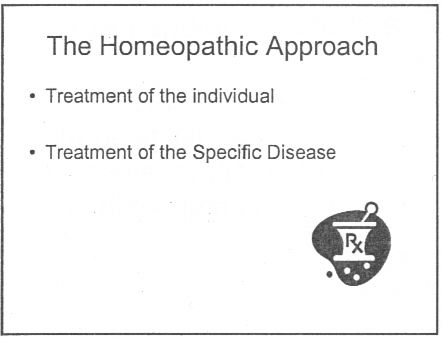
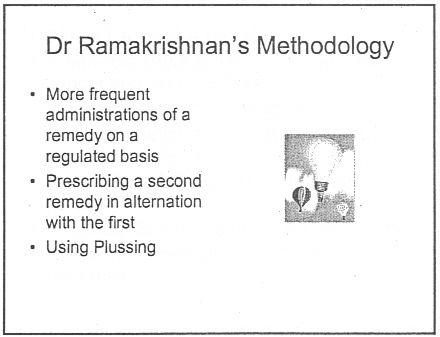
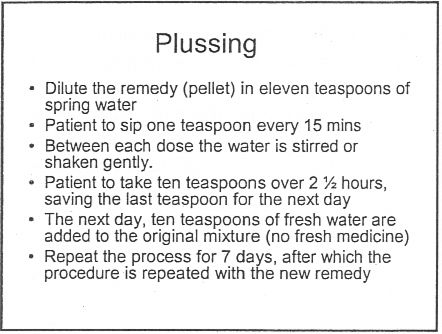
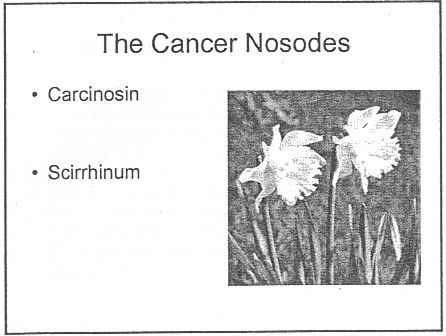
Specific treatments for a named disease are recommended.
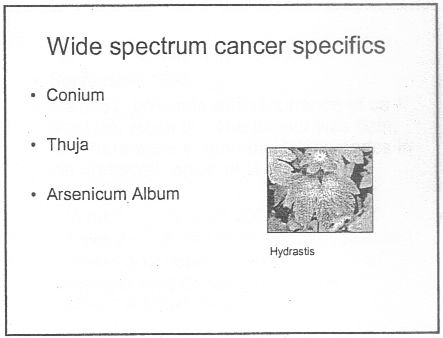
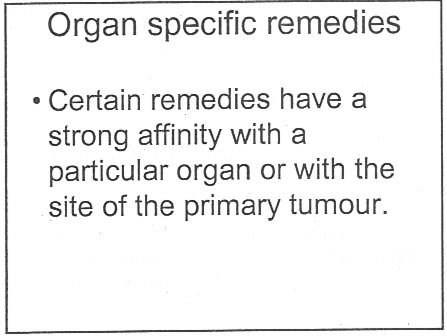
What happened to treating the whole person? Now specific organs are being treated. The term "affinity", as used here, is of course sheer hocus pocus.

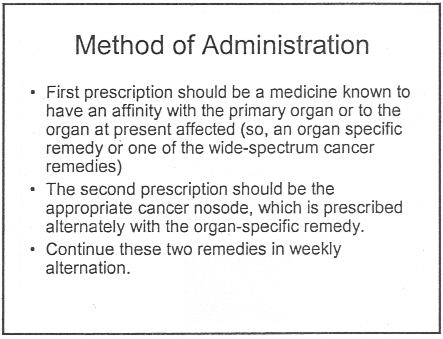
It is easy to forget when reading this that none of the “medicines” contain any medicine whatsoeever.
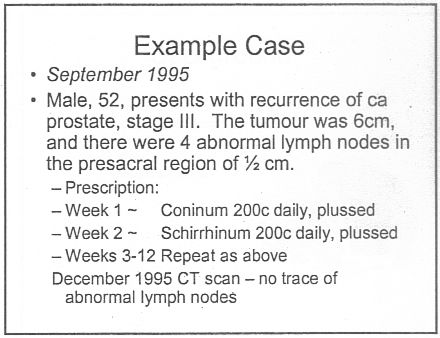
Notice that the term "remedy" is used throughout. Any reasonable person would interpret "remedy" to imply "cure", though no doubt a homeopath, if challenged, would claim that "remedy" carried no such implication. The last slide is typical of junk medicine: the personal testimonial, supplied with no detail whatsoever. Just an anecdote which is useless as evidence.
This lecture alone strikes me as a cruel (and possibly illegal) hoax perpetrated on desperate patients. Of course a true believer might get some solace from taking the sugar pills, but that is not sufficient justification.
The same course dealt with quite a lot of other "named diseases", autism, ADHD and coping with a heart attack. And, you are asked, did you think arnica is just a first aid remedy?
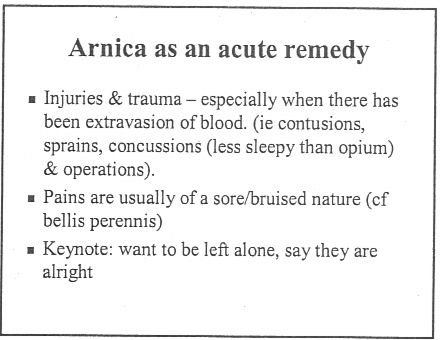
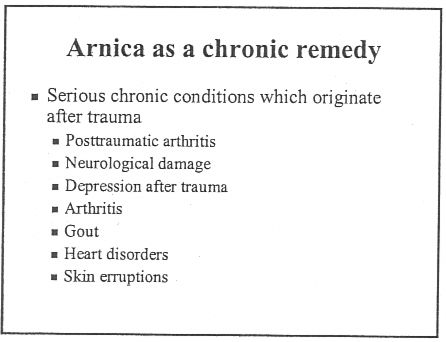
If that isn’t a list of "named diseases", what is? The code of ethics appears to be a total sham.
And of course never forget that the “arnica” doesn’t contain any arnica anyway. And if you don’t believe that you can read the words of Kate Chatfield, module leader on thie very course, as recorded in the minutes of evidence to the Select Committee on Science and Technology .
Q538 Lord Broers: I have a simple, technical question about homeopathy and drugs. Is it possible to distinguish between homeopathic drugs after they have been diluted? Is there any means of distinguishing one from the other?
Ms Chatfield: Only by the label.
You can read a lovely analysis of the views of Kate Chatfield by physicist A.P. Gaylard here.
Follow-up
The Daily Telegraph. January 8th 2009 Ian Douglas reported on this post: The workings of a BSc in homeopathy
The Lancashire Evening Post carried a big spread on January 15th, Professor seeks out the truth about ‘quackery’.
River’s Edge. News and thoughts from Preston, Lancashire reviewed the Lancashire Evening Post article on Saturday January 16th: Homeopathy at UCLAN, a degree in quackery.
The cost of trying to stop this material being revealed. UCLAN told me on 5 February 2010 that the legal costs alone were £80,307.94 (inc. VAT). That doesn’t include staff time and photocopying. I’m not convinced that this was a good way to spend taxpayers’ money.
Can’t resist another bit of straight plagiarism. In this week’s Times Higher Education, the inimitable Laurie Taylor wrote this.
|
Rock around the clock Professor Georgina Kunzite, the Head of our Department of Crystal Healing, has reacted strongly to the recent High Court ruling that the University of Central Lancashire must hand over teaching materials from its defunct homeopathy course to a campaigning sceptic. Speaking to our reporter, Keith Ponting (30), she said she had no intention of acceding to any similar request for materials from her own oversubscribed course in crystal therapy. Such a move, she argued, risked undermining the power of the crystals, which were notoriously wary of attempts to question their curative validity. She had initially been disconcerted by the court’s decision. “But since then I’ve taken to sleeping with a large lump of pink rhodochrosite crystal under my pillow. This does mildly disturb my partner, but it has certainly helped to rebalance my chakra.” |
Well well, where could he have got that idea?
There is no topic more widely discussed than what one should eat in order to stay healthy. And there are few topics where there evidence is so lacking in quality. This post isn’t about quackery, but about something much more important. it is about the real science (if it merits that description) behind dietary advice. I’m not an expert in nutrition, but I do know a bit about the nature of evidence. I’m continually astonished by the weakness of the evidence for some things that have become received truths, and nowhere is that more true than in nutrition.
|
The BMJ used my review of Gary Taube’s book, The Diet Delusion, to start off their new Round Table feature [full text link to BMJ]. The published version had some big cuts so I publish the original version here. Taubes was kind enough to send me a copy of the book after I’d mentioned his wonderful New York Times piece in my previous excursion into the murky world of diet and health, Diet and health. What can you believe: or does bacon kill you? |
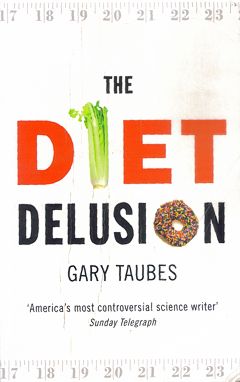
|
The biggest omission in the BMJ version was Taubes’ own ten point summary of his conclusions (on page 454).
"“As I emerge from this research, though, certain conclusions seem inescapable to me, based on existing knowledge
- Dietary fat, whether saturated or not, is not a cause of obesity, heart disease, or any other chronic disease of civilization
- The problem is the carbohydrates in the diet, their effect on insulin secretion, and thus the hormonal regulation of homeostasis – the entire harmonic ensemble of the human body. The more easily digestible and refined the carbohydrates, the greater the effect on our health, weight, and well-being.
- Sugars – sucrose and high-fructose corn syrup specifically – are particularly harmful, probably because the combination of fructose and glucose simultaneously elevates insulin levels while overloading the liver with carbohydrates.
- Through their direct effect on insulin and blood sugar, refined carbohydrates, starches, and sugars are the dietary cause of coronary heart disease and diabetes. They are the most likely dietary causes of cancer, Alzheimer’s disease, and the other chronic diseases of civilization.
- Obesity is a disorder of excess fat accumulation, not overeating, and not sedentary behaviour.
- Consuming excess calories does not cause us to grow fatter, any more than it causes a child to grow taller. Expending more energy than we consume does not lead to long-term weight loss; it leads to hunger.
- Fattening and obesity are caused by an imbalance – a disequilibrium – in the hormonal regulation of adipose tissue and fat metabolism. Fat synthesis and storage exceed the mobilization of fat from the adipose tissue and its subsequent oxidation. We become leaner when the hormonal regulation of the fat tissue reverses this balance.
- Insulin is the primary regulator of fat storage. When insulin levels are elevated – either chronically or after a meal – we accumulate fat in our fat tissue. When insulin levels fall, we release fat from our fat tissue and use it for fuel.
- By stimulating insulin secretion, carbohydrates make us fat and ultimately cause obesity. The fewer carbohydrates we consume, the leaner we will be.
- By driving fat accumulation, carbohydrates also increase hunger and decrease the amount of energy we expend in metabolism and physical activity.”
It is on these bases that Taubes suggests that the increase in obesity is, in part, a consequence of the recommendation of a low fat, and hence high sugar diet.
|
The Diet Delusion [ pp 601] (published in the USA as Good Calories, Bad Calories) Gary Taubes 2008 There is no topic more widely discussed than what one should eat in order to stay healthy. And there are few topics where the evidence is so lacking in quality. It is also a topic that is besieged by gurus, cranks and supplement hucksters. You need to beware of misleading titles. Dietitians are good. Nutritionists are sometimes good. But titles like ‘nutritional therapist’ and ‘nutritional medicine’ are usually warning signs of alternative therapists and/or pill salespeople. Gary Taubes is a journalist, but he is quite an exceptional journalist. His account of the importance of randomisation for the establishment of causality is one of the best ever and it was published not in an academic journal, but in the New York Times [1]. His book, The Diet Delusion, is in the same mould. It is more complete and more scholarly than most professional scientists could manage. Not only does it cover the literature right back to Samuel Johnson, but it is also particularly good at unravelling what one might call the politics of science. And by politics I don’t mean the vast lobbying industry that has built up with the aim of selling you unnecessary supplements, but the politics of academia. Obesity sounds simple. If you are fat it is because you eat too much or exercise too little, right? Well no, it’s not as simple as that. For a start, it has been shown time and time again that low fat diets, and exercise, have small and temporary effects on weight. The problem with diet and health revolves round causality. The law of conservation of energy is an inevitable truth, but says nothing about causality. It could imply that you get fat because you eat too much, or equally the causal arrow could point the other way and “we eat more, move less and have less energy to expend because we are metabolically or hormonally driven to get fat”. The assumption that positive caloric balance is the cause of weight gain has predominated since the 1970s and “this simple misconception has led to a century of misguided obesity research”. At the heart of the problem is the paucity of randomised trials, which are the only way to establish causality. Those that there are have usually shown that diet does not matter as much as we are told. Taubes concludes
I think it can certainly be argued that the problem of causality has been greatly underestimated. We are warned constantly of the dangers of processed meat, on the basis of very unconvincing evidence [2]. This is one reason why we still know so little about the causes of obesity, diabetes and heart disease. For Taubes, a major villain was the US nutritionist Ancel Keys (1904 – 2004). His It is quite possible that there was rather more to be said for the Atkins diet than was apparent at the time. The fact that Atkins was not a university scientist, that his views were extreme and that he was so obviously out to make a lot of money from it, gave him all the appearance of being yet another profiteering diet guru. He was dismissed by the medical establishment as a quack. Taubes points out that conflict of interest cuts both ways. Atkins’ sternest critics at Harvard were funded by General Foods, Coca-Cola and the sugar industry. It adds up to a sorry story of a conflict of vested interests and scientific vanity. Taubes’ final judgement is harsh. He quotes Robert Merton’s description [4] of what science is, or should be.
He then comments
It took Taubes five years to write this book, and he has nothing to sell apart from his ideas. No wonder it is so much better than a scientist can produce. Such is the corruption of science by the cult of managerialism that no university would allow you to spend five years on a book [5]. I find all ten points in his summary convincing. But his most important conclusion is that you cannot have any certainty without randomised trials. The business of nutrition is greatly at fault for not having put more effort into organising randomised trials. Until they are done, we’ll never really know, and we shouldn’t pretend that we do. 1. Taubes G. Do we really know what makes us healthy? New York Times 2007 Sep 16.[full text link] [pdf file] 2. Colquhoun, D. (3 May 2009) Diet and health. What can you believe: or does bacon kill you?. 3. Greenberg, S.A.. 2009 How citation distortions create unfounded authority: analysis of a citation network. BMJ ;339:b2680 [pdf file]. 4. Merton, R. K. Behavior Patterns of Scientists . Leonardo, Vol.3 1970; 3(2):213-220. From Jstor [or pdf file] 5. Lawrence PA. The mismeasurement of science. Curr Biol 2007; 17(15):R583-R585.PM:17686424 [pdf file] [commentary] |
If length had allowed, there should certainly have been a reference here to Robert Lustig of UCSF. He is an academic nutritionist who supports the main thesis of Taubes’ book. See, for example, his 2005 review, Childhood obesity: behavioral aberration or biochemical drive? Reinterpreting the First Law of Thermodynamics [full
text link]. Lustig’s slide show, The Trouble with Fructose is available in the NIH web site.
There are a couple of other articles by Taubes that are well worth reading. The Scientist and the Stairmaster Why most of us believe that exercise makes us thinner—and why we’re wrong. Gary Taubes, in New York Magazine, and We can’t work it out, in the Guardian.
You can see Taubes in action on YouTube, for example in “on Cholesterol and Science Practices“, and “on Carbohydrates and Degenerative Diseases“. There is also a video of Taubes on medical grand rounds at Dartmouth-Hitchcock Medical Center in June 2009. You can see Robert Lustig on YouTube too: “Sugar: The Bitter Truth“.
Follow-up
22 December.2009, Unlike the serious questions dealt with in the Diet Delusion, this concerns merely another bit of the ubiquitous nutribollocks that crops up in the media, While writing this I was listening to the excellent early evening news programme, PM, run by Eddie Mair, when a diet-related topic came up, it was nonsense about how a cocktail made with vodka, cointreau, acai juice and pomegranate juice would not give you a hangover. I suppose it was meant as christmas fun but whenever I hear the words ‘antioxidant‘ or ‘superfood; I feel an email coming on. It seems that Eddie Mair liked the fact that the email contained the words ‘quack’ and ‘codswallop’ because the next thing I knew I was asked to give an interview on next day’s programme. The mp3 is here.
It seems very reasonable to suggest that taxpayers have an interest in knowing what is taught in universities. The recent Pittilo report suggested that degrees should be mandatory in Acupuncture, Herbal Medicine and Traditional Chinese Medicine. So it seems natural to ask to see what is actually taught in these degrees, so one can judge whether it protects the public or endangers them.
Since universities in the UK receive a great deal of public money, it’s easy. Just request the material under the Freedom of Information Act.
Well, uh, it isn’t as simple as that.
Every single application that I have made has been refused. After three years of trying, the Information Commissioner eventually supported my appeal to see teaching materials from the Homeopathy "BSc" at the University of Central Lancashire. He ruled that every single objection (apart from one trivial one) offered by the universities was invalid. In particular, it was ruled that univerities were not "commercial" organisations for the purposes of the Act.
So problem solved? Not a bit of it. I still haven’t seen any of the materials from the original request because the University of Central Lancashire appealed against the decision and the case of University of Central Lancashire v Information Commissioner is due to be heard on November 3rd, 4th and 5th in Manchester. I’m joined (as lawyers say) as a witness. Watch this space.
UCLan is not the exception. It is the rule. I have sought under the Freedom of Information Act, teaching materials from UClan (homeopathy), University of Salford (homeopathy, reflexology and nutritional therapy), University of Westminster (homeopathy, reflexology and nutritional therapy), University of West of England, University of Plymouth and University of East London, University of Wales (chiropractic and nutritional therapy), Robert Gordon University Aberdeen (homeopathy), Napier University Edinburgh (herbalism).
In every single case, the request for teaching materials has been refused. And that includes the last three, which were submitted after the decision of the Information Commissioner. They will send things like course validation documents, but these are utterly uninformative box-ticking documents. They say nothing whatsoever about what is actually taught.
The fact that I have been able to discover quite a lot about what’s being taught owes nothing whatsoever to the Freedom of Information Act. It is due entirely to the many honest individuals who have sent me teaching materials, often anonymously. We should be grateful to them. Their principles are rather more impressive than those of their principals.
Since this started about three years ago, two of the universities, UCLan and Salford, have shut down entry to all of their CAM courses. And Westminster has shut two of them, with more rumoured to be closing soon. They are to be congratulated for that, but is far from being the end of the matter. The Department of Health, and some of the Royal Colleges, have yet to catch up with the universities, The Pittolo report, which recommends making degrees compulsory, is being considered by the Department of Health. The consultation ends on November 2nd: if you haven’t yet responded, please do so now (see how here, and here).
A common excuse: the university does not possess teaching materials (yes, really)
Several of the universities claim that they cannot send teaching materials, because they have no access to them. This happens when the university has accredited a course that is run by another, privately run, institution. The place that does the actual teaching, being private, is exempt from the Freedom of Information Act.
The ludicrous corollary of this excuse is that the university has accredited the course without checking on what is taught, and in some cases without even having seen a timetable.
The University of Wales
In fact the University of Wales doesn’t run courses at all. Like the (near moribund) University of London, it acts as a degree-awarding authority for a lot of Welsh Universities. It also validates a lot of courses in non-university institutions, 34 or so of them in the UK, and others scattered round the world.
Many of them are theological colleges. It does seem a bit odd that St Petersburg Christian University, Russia, and International Baptist Theological Seminary, Prague, should be accredited by the University of Wales.
They also validate the International Academy of Osteopathy, Ghent (Belgium), Osteopathie Schule Deutschland, the Istituto Superiore Di Osteopatia, Milan, the Instituto Superior De Medicinas Tradicionales, Barcelona, the Skandinaviska Osteopathögskolan (SKOS) Gothenburg, Sweden and the College D’Etudes Osteopathiques, Canada.
The 34 UK institutions include the Scottish School of Herbal Medicine, the Northern College of Acupuncture and the Mctimoney College of Chiropractic.
The case of the Nutritional Therapy course has been described already in Another worthless validation: the University of Wales and nutritional therapy. It emerged that the course was run by a grade 1 new-age fantasist. It is worth recapitulating the follow up.
What does the University of Wales say? So far, nothing. Last week I sent brief and polite emails to Professor Palastanga and to
Professor Clement to try to discover whether it is true that the validation process had indeed missed the fact that the course organiser’s writings had been described as “preposterous, made-up, pseudoscientific nonsense” in the Guardian.
So far I have had no reply from the vice-chancellor, but on 26 October I did get an answer from Prof Palastanga.
As regards the two people you asked questions about – J.Young – I personally am not familiar with her book and nobody on the validation panel raised any concerns about it. As for P.Holford similarly there were no concerns expressed about him or his work. In both cases we would have considered their CV’s as presented in the documentation as part of the teaching team. In my experience of conducting degree validations at over 16 UK Universities this is the normal practice of a validation panel.
I have to say this reply confirms my worst fears. Validation committees such as this one simply don’t do their duty. They don’t show the curiosity that is needed to discover the facts about the things that they are meant to be judging. How could they not have looked at the book by the very person that they are validating? After all that has been written about Patrick Holford, it is simply mind-boggling that the committee seems to have been quite unaware of any of it.It is yet another example of the harm done to science by an unthinking, box-ticking approach.
Incidentally, Professor Nigel Palastanga has now been made Pro Vice-Chancellor (Quality) at the University of Wales and publishes bulletins on quality control. Well well.
The McTimoney College of Chiropractic was the subject of my next Freedom of Information request to the University of Wales. The reasons for that are, I guess, obvious. They sent me hundreds of pages of validation documents, Student Handbooks (approx 50 pages), BSc (Hons) Chiropractic Course Document. And so on. Reams of it. The documents mostly are in the range of 40 to 100 pages. Tons of paper, but none of it tells you anyhing whatsover of interest about what’s being taught. They are a testament to the ability of universities to produce endless vacuous prose with
very litlle content.
They did give me enough information to ask for a sample of the teaching materials on particular topics. But I gor blank refusal, on the grounds that they didn’t possess them. Only McTimoney had them. Their (unusually helpful) Freedom of Information officer replied thus.
“The University is entirely clear about the content of the course but the day to day timetabling of teaching sessions is a matter for the institution rather than the University and we do not require or possess timetable information. The Act does not oblige us to request the information but there is no reason you should not approach McTimoney directly on this.”
So the university doesn’t know the timetable. It doesn’t know what is taught in lectures, but it is " entirely clear about the content of the course".
This response can be described only as truly pathetic.
Either this is a laughably crude form of obstruction of my request, or perhaps, even more frighteningly, the university really believes that its endless box-ticking documents actually provide some useful control of quality. Perhaps the latter interpretation is more charitable. After all, the QAA, CHRE, UUK and every HR department share similar delusions about what constitutes quality.
Perhaps it is just yet another consequence of having science run largely by people who have never done it and don’t understand it.
Validation is a business. The University of Wales validates no fewer than 11,675 courses altogether. Many of these are perfectly ordinary courses in universities in Wales, but they validate 594 courses at non-Welsh accredited institutions, an activity that earned them £5,440,765 in the financial year 2007/8. There’s nothing wrong with that if they did the job properly. In the two cases I’ve looked at, they haven’t done the job properly. They have ticked boxes but they have not looked at what’s being taught or who is teaching it.
The University of Kingston
The University of Kingston offers a “BSc (Hons)” in acupuncture. In view of the fact that the Pittilo group has recommended degrees in acupuncture, there is enormous public interest in what is taught in such degrees, so I asked.
They sent the usual boring validation documents and a couple of sample exam papers . The questions were very clinical, and quite beyond the training of acupuncturists. The validation was done by a panel of three, Dr Larry Roberts (Chair, Director of Academic Development, Kingston University), Mr Roger Hill (Accreditation Officer, British Acupuncture Accreditation Board) and Ms Celia Tudor-Evans (Acupuncturist, College of Traditional Acupuncture, Leamington Spa). So nobody with any scientific expertise, and not a word of criticism.
|
Further to your recent request for information I am writing to advise that the University does not hold the following requested information: (1) Lecture handouts/notes and powerpoint presentations for the following sessions, mentioned in Template 3rd year weekend and weekday course v26Aug2009_LRE1.pdf (a) Skills 17: Representational systems + Colour & Sound ex. Tongue feedback 11 (b) Mental Disease + Epilepsy Pulse feedback 21 (c) 18 Auricular Acupuncture (d) Intro. to Guasha + practice Cupping, moxa practice Tongue feedback 14 (2) I cannot see where the students are taught about research methods and statistics. I would like to see Lecture handouts/notes and PowerPoint presentations for teaching in this area, but the ‘timetables’ that you sent don’t make clear when or if it is taught. The BSc Acupuncture is delivered by a partner college, the College of Integrated Chinese Medicine (CICM), with Kingston University providing validation only. As such, the University does not hold copies of the teaching materials used on this course. In order to obtain copies of the teaching materials required you may wish to contact the College of Integrated Chinese Medicine directly. This completes the University’s response to your information request. |
So again we see that Kingston has validated the course but has not seen a timetable, far less what is taught. My reply was thus
|
Yes I am exceedingly unhappy about it. The university attaches its name to the course so it must obviously be able to get the material simply by asking for it (I’m surprised that the university should endorse a course without knowing what is taught on it, but that’s another matter). I request formally that you obtain this material. If necessary please read this as a formal appeal. |
I await with interest. In every single case so far, the internal review has merely confirmed the initial refusal. It means a bit of a delay before the case goes to the Information Commisssioner’s Office.
Napier University Edinburgh
Napier University runs a "BSc (Hons) Herbal medicine". (brochure here). Since herbal medicine is a subject of the Pittilo recommendations, there is enormous public interest in what they teach. So I asked, under the Freedom of Information (Scotland) Act (2002). They sent quite quickly validation and accreditation documents, some examination papers, timetables and lecture lists.
The validation was the usual vacuous box-ticking stuff though it did reveal that the course “made extensive use of techniques such as tongue and pulse diagnosis”, which are well known phoney diagnosis methods, about as much use as a pendulum (as used at Westminster University).
As at Kingston University, the exam papers they chose to send were mostly "pretend doctor" stuff. One of them was
Discuss the herbal practitioner’s role in the management of IHD [ischaemic heart disease)
How one would like to see what the students said, and, even more one would like to see the model answer. Amateurs who try to treat potentially serious conditions are a danger to the public.
So then we got to the interesting bit, the request for actual teaching materials.
|
I have looked at the material that you sent and I’d now like to make the following supplementary request (A) Lecture notes/handouts and powerpoint slides for the following small smaple of lectures HRB09102 Materia Medica 4 Materia Medica 3 HRB08103 Clinical Medicine and Diagnosis 4 (HRB09104) HRB09100 Materia Medica & Herbal Practice BSc Herbal Medicine : Materia Medica HRB07102 Lastly, I can see nowhere in the timetable, lectures that deal with Research methods, clinical trial design and statistics. |
No prizes for guessing the result Total refusal to send any of them. To make matters worse, the main grounds for refusal were the very "commercial interests" which, after careful legal examination, the Information Commissioner (for England and Wales) had decided were invalid. They say too that "The public interest in withholding the information is greater than the public interest in its release".. It is hard to see how the public interest is served by concealing from the people who pay for the degrees what is taught on degrees that Pittilo wants to make compulsory. [Download the whole response]
The matter is now under internal appeal (read the appeal) and eventually we shall find out whether the Scottish Information Commissioner backs the judgement.
Robert Gordon University Aberdeen
This case has particular interest because the Vice-Chancellor of Robert Gordon University is Professor Michael Pittilo, chair of the highly contentious steering group that recommended degress in CAM. Robert Gordon University (RGU) does not teach herbal medicine or acupuncture. But they do run An Introduction to Homeopathy. All the degrees in homeopathy have closed. It is perhaps the daftest and most discredited of all the popular forms of Magic Medicine. But Professor Pittilo thinks it is an appropriate subject to teach in his university.
So again I asked for information under the Freedom of Information (Scotland) Act 2002. They sent me quite quckly a list of the powerpoint presentations used on the courses [download it]. I asked for a small sample of the powerpoints. And again the university did not possess them!
|
I should like to see only the following three powerpoint presentations in the first instance, please.
Please can you let me know also who produced the powerpoints. (1) Evidence for homeopathy I note that you will have to request them but since they are being offered as part of a course offered by RGU, so RGU is responsible for their quality, I presume that this should cause no problem. |
The request was refused on much the same grounds as used by Napier University. As usual, the internal review just confirmed the initial proposal (but dropped the obviously ludicrous public interest defence). The internal review said
“it is mainly the quality of our courses (including course material) and teaching which has given us the position of "the best modern university in Scotland"
I am bound to ask, if the university is so proud of its course material, why is it expending so much time and money to prevent anyone from seeing a small sample of it?
My appeal has been sent to the Scottish Information Commissioner [download the appeal].
What are vice-chancellors thinking about?
I find it very difficult to imagine what is going through the heads of vice-chancellors who run courses in mumbo-jumbo. Most of them don’t believe a word of it (though Michael Pittilo might be an exception) yet they foist it on their students. How do they sleep at night?
Recently the excellent Joe Collier wrote a nice BMJ blog which applauded the lack of respect for authority in today’s students, Joe Collier says good riddance to old-fashioned respect. I couldn’t resist leaving a comment.
|
I couldn’t agree more. There is nothing quite so unnerving as being addressed as “Sir”. It is an advantage of age that you realise what second-rate people come to occupy very grand positions. Still odder since, if occasionally they are removed for incompetence, they usually move to an even grander position. I guess that when I was an undergraduate, I found vice-chancellors somewhat imposing. That is, by and large, not a view that survives closer acquaintance. |
Should teaching materials be open to the public?
There is only one university in the world that has, as a matter of policy, made all of its teaching material open to the public, that is the Massachusetts Institute of Technology (MIT). I can recommend strongly course 18.06, a wonderful set of lectures on Linear Algebra by Gilbert Strang. (It is also a wonderful demonstration of why blackboards may be better than Powerpoint for subjects like this). Now they are on YouTube too.
A lot of other places have made small moves in the same direction, as discussed recently in Times Higher Education, Get it Out in the Open.
Now the OU is working with other British universities to help them develop and share open course materials. In June, at the celebrations for the 40th anniversary of the OU, Gordon Brown announced funding to establish the Support Centre for Open Resources in Education at the OU, as part of a £7.8 million grant designed to enhance the university’s national role.
The funding follows a separate grant of £5.7 million from the Higher Education Funding Council for England for universities across the sector to make thousands of hours of free learning materials available.
Much material is available on the web, when individual teachers choose to place it there, but at the same time there is a move in the other direction. In particular, the widespread adoption of Moodle has resulted in a big decrease in openness. Usually you have to be registered on a course to see the material. Even other people in the university can’t see it. I think that is a deplorable development (so, presumably, does HEFCE).
Conclusion
I was told by the Univerity of Kingston that
“The course is one which the University has validated and continues to be subject to the University’s quality assurance procedures, such as internal subject reviews, annual monitoring and external examining”
The only conclusion to be drawn from this is that “quality arrurance procedures” work about as well in universities as they did in the case of baby Peter. No doubt they were introduced with worthy aims. But in practice they occupy vast amounts of time for armies of bureaucrats, and because the brain does not need to be engaged they end up endorsing utter nonsenes. The system is broken.
Resistance is futile. You can see a lot of the stuff here
It is hard to keep secrets in the internet age. Thanks to many wonderful people who have sent me material. you can see plenty of what is taught, despite the desperate attempts of vice-chancellors to conceal it. Try these links.
What is actually taught
Chinese medicine -acupuncture gobbledygook revealed
https://www.dcscience.net/?p=1950
Consultation opens on the Pittilo report: help top stop the Department of Health making a fool of itself
https://www.dcscience.net/?p=2007
Why degrees in Chinese medicine are a danger to patients
https://www.dcscience.net/?p=2043
More make-believe from the University of Westminster. This time its Naturopathy
https://www.dcscience.net/?p=1812
The last BSc (Hons) Homeopathy closes! But look at what they still teach at Westminster University.
https://www.dcscience.net/?p=1329
The opposite of science
https://www.dcscience.net/?p=1191
Bad medicine. Barts sinks further into the endarkenment.
https://www.dcscience.net/?p=1143
A letter to the Times, and progress at Westminster
https://www.dcscience.net/?p=984
Nutritional Fairy Tales from Thames Valley University
https://www.dcscience.net/?p=260
Westminster University BSc: amethysts emit high yin energy
https://www.dcscience.net/?p=227
References for Pittilo report consultation
A very bad report: gamma minus for the vice-chancellor
https://www.dcscience.net/?p=235
The Times (blame subeditor for the horrid title)
http://www.timesonline.co.uk/tol/comment/columnists/guest_contributors/article4628938.ece
Some follow up on the Times piece
https://www.dcscience.net/?p=251
The Health Professions Council breaks its own rules: the result is nonsense
https://www.dcscience.net/?p=1284
One month to stop the Department of Health endorsing quackery. The Pittilo questionnaire,
https://www.dcscience.net/?p=2310
An excellent submission to the consultation on statutory regulation of alternative medicine (Pittilo report)
https://www.dcscience.net/?p=2329
Follow-up
Two weeks left to stop the Department of Health making a fool of itself. Email your response to tne Pittilo consultation to this email address HRDListening@dh.gsi.gov.uk
I’ve had permission to post a submission that has been sent to the Pittilo consultation. The whole document can be downloaded here. I have removed the name of the author. It is written by the person who has made some excellent contributions to this blog under the pseudonym "Allo V Psycho".
The document is a model of clarity, and it ends with constructive suggestions for forms of regulation that will, unlike the Pittilo proposals, really protect patients
Here is the summary. The full document explains each point in detail.
|
Executive Summary
Instead, safe regulation of alternative practitioners should be through:
|
The first two recommendations for effective regulation are much the same as mine, but the the third one is interesting. The problem with the Cancer Act (1939), and with the Unfair Trading regulations, is that they are applied very erratically. They are the responsibility of local Trading Standards offices, who have, as a rule, neither the expertise nor the time to enforce them effectively. A Health Advertising Standards Authority could perhaps take over the role of enforcing existing laws. But it should be an authority with teeth. It should have the ability to prosecute. The existing Advertising Standards Authority produces, on the whole, excellent judgements but it is quite ineffective because it can do very little.
A letter from an acupuncturist
I had a remarkable letter recently from someone who actually practises acupuncture. Here are some extracts.
|
“I very much enjoy reading your Improbable Science blog. It’s great to see good old-fashioned logic being applied incisively to the murk and spin that passes for government “thinking” these days.” “It’s interesting that the British Acupuncture Council are in favour of statutory regulation. The reason is, as you have pointed out, that this will confer a respectability on them, and will be used as a lever to try to get NHS funding for acupuncture. Indeed, the BAcC’s mission statement includes a line “To contribute to the development of healthcare policy both now and in the future”, which is a huge joke when they clearly haven’t got the remotest idea about the issues involved.” “Before anything is decided on statutory regulation, the British Acupuncture Council is trying to get a Royal Charter. If this is achieved, it will be seen as a significant boost to their respectability and, by implication, the validity of state-funded acupuncture. The argument will be that if Physios and O.T.s are Chartered and safe to work in the NHS, then why should Chartered Acupuncturists be treated differently? A postal vote of 2,700 BAcC members is under-way now and they are being urged to vote “yes”. The fact that the Privy Council are even considering it, is surprising when the BAcC does not even meet the requirement that the institution should have a minimum of 5000 members (http://www.privy-council.org.uk/output/Page45.asp). Chartered status is seen as a significant stepping-stone in strengthening their negotiating hand in the run-up to statutory regulation.” “Whatever the efficacy of acupuncture, I would hate to see scarce NHS resources spent on well-meaning, but frequently gormless acupuncturists when there’s no money for the increasing costs of medical technology or proven life-saving pharmaceuticals.” “The fact that universities are handing out a science degree in acupuncture is a testament to how devalued tertiary education has become since my day. An acupuncture degree cannot be called “scientific” in any normal sense of the term. The truth is that most acupuncturists have a poor understanding of the form of TCM taught in P.R.China, and hang on to a confused grasp of oriental concepts mixed in with a bit of New Age philosophy and trendy nutritional/life-coach advice that you see trotted out by journalists in the women’s weeklies. This casual eclectic approach is accompanied by a complete lack of intellectual rigour. My view is that acupuncturists might help people who have not been helped by NHS interventions, but, in my experience, it has very little to do with the application of a proven set of clinical principles (alternative or otherwise). Some patients experience remission of symptoms and I’m sure that is, in part, bound up with the psychosomatic effects of good listening, and non-judgemental kindness. In that respect, the woolly-minded thinking of most traditional acupuncturists doesn’t really matter, they’re relatively harmless and well-meaning, a bit like hair-dressers. But just because you trust your hairdresser, it doesn’t mean hairdressers deserve the Privy Council’s Royal Charter or that they need to be regulated by the government because their clients are somehow supposedly “vulnerable”.” |
Earlier postings on the Pittilo recommendations
A very bad report: gamma minus for the vice-chancellor https://www.dcscience.net/?p=235
Article in The Times (blame subeditor for the horrid title)
http://www.timesonline.co.uk/tol/comment/columnists/guest_contributors/article4628938.ece
Some follow up on The Times piece
https://www.dcscience.net/?p=251
The Health Professions Council breaks its own rules: the result is nonsense
https://www.dcscience.net/?p=1284
Chinese medicine -acupuncture gobbledygook revealed
https://www.dcscience.net/?p=1950
Consultation opens on the Pittilo report: help top stop the Department of Health making a fool of itself https://www.dcscience.net/?p=2007
Why degrees in Chinese medicine are a danger to patients https://www.dcscience.net/?p=2043
One month to stop the Department of Health endorsing quackery. The Pittilo questionnaire, https://www.dcscience.net/?p=2310


